“A Piece of the Action”
Written by David P. Harmon and Gene L. Coon
Directed by James Commack
Season 2, Episode 20
Production episode 60349
Original air date: January 12, 1968
Stardate: unknown
Captain’s log. The Enterprise approaches Sigma Iotia II, and Uhura makes contact with an official on the planet, whose name is Oxmyx and whose title is “Boss.” Kirk explains to a rather confused Oxmyx that they only just now, one hundred years later, received the final radio transmission from the Horizon, a ship that went missing. It indicated that the ship had visited Iotia, so the Enterprise is following up, since there may have been some cultural contamination (the Horizon‘s heyday was before the Prime Directive). Terms like “galaxy” and “subspace” just confuse the heck out of Oxmyx, and Kirk amusedly says that he’ll explain in detail when he meets up with him. Oxmyx says he’ll send a reception committee to meet him—and the coordinates he provides are “the intersection down the block, by the yellow fireplug.” Scotty is able to pinpoint those oh-so-specific coordinates (probably by triangulating Uhura’s signal) and Kirk, Spock, and McCoy beam down—
—and find themselves greeted by two guys in suits and hats carrying Tommy guns and telling them to put their hands over their heads.
Iotia seems to be a replica of early 20th-century Chicago, complete with period slang coming out of the people’s mouths. They’re to be escorted to Oxmyx, but en route there’s a drive-by hit, with one of Oxmyx’s gangsters being killed.
A rather appalled landing party is brought to Oxmyx. En route two women complain about the lack of laundry pickup and the busted street lights—they pay their percentages, they want their services.
Oxmyx is in his office playing pool. He explains that there are a dozen bosses, not counting the small fry, but Oxmyx has the biggest territory. He also orders his goon to retaliate for Krako’s hit—Krako is the most powerful of the other eleven bosses.
Spock notices a prominently displayed book: Chicago Mobs of the Twenties, published in 1992. Oxmyx describes it as “the” book. The Iotians are imitative, and apparently they built their entire culture around this book.
Oxmyx wants Kirk to supply him with weapons and resources so he can wipe out the other bosses. If he doesn’t, he’ll send them back to the Enterprise in a box. Kirk refuses, of course. Oxmyx does have the three phasers and communicators the landing party came down with, and he wants another hundred or so.
The three Enterprise crew are taken away and Oxmyx calls the ship and tells Scotty that he has eight hours to provide some fancy heaters and troops to instruct in their use or he’ll put the landing party on ice. Scotty only understands a fraction of what Oxmyx is saying.
Imprisoned in a warehouse, Kirk, Spock, and McCoy agree that they need to fix the Horizon‘s contamination, and Spock says that Oxmyx’s heart is in the right place: the planet needs to be united, preferably by a method other than multiple hits.
Kirk decides to distract the guards by teaching them a nonsense card game called fizzbin, which confuses them so much that the trio are able to take them out with a thrown table, a nerve pinch, and good old-fashioned fisticuffs. Kirk orders Spock to find a radio station and break into the signal to alert Uhura to beam them up. Kirk will do likewise, but he’s bringing Oxmyx to the ship with him.
But before Kirk can do that, he’s kidnapped by Krako. He’s got all of Oxmyx’s communications bugged. Kirk guesses that Krako wants the same thing Oxmyx wants—but Krako’s not threatening Kirk, he’s offering a percentage of the profits. Kirk’s got a counter proposal: that Oxmyx, Krako, and the other bosses sit down and talk like reasonable people. Krako thinks that’s nuts—that’s not how The Book says to do things—so he quickly switches to threats. Kirk says no deal, and Krako puts him on ice.
Oxmyx calls the Enterprise—and is very surprised to see that Spock is back on the ship—and informs them that Kirk has been kidnapped. Spock reluctantly agrees to Oxmyx’s terms of truce and assistance in retrieving Kirk from Krako’s clutches. This proves unwise, as Oxmyx takes them prisoner as soon as they materialize.
However, Kirk escapes all on his own thanks to clever use of a radio wire, a garbage basket, and a blanket. He rescues Spock and McCoy, and the former reports to Kirk that the computer was singularly unhelpful, as logic and facts don’t really apply here. (He ain’t kiddin’.)
So Kirk plays a hunch. He gets Oxmyx’s two thugs to remove their suits, and Kirk and Spock change into them, and head to Krako’s in a car—which Kirk drives with a spectacular lack of skill, to the point where even Spock gives him shit about it.
A kid, wanting a piece of the action, offers to help them with their hit on Krako by distracting the two guards on Krako’s place so Kirk and Spock can take them out efficiently without a big shootout on the street. Inside, they use their phasers on two more guards, but two more get the drop on them.
Kirk then gets into character and announces that the Federation is takin’ over. They don’t want to use their muscle, they prefer to be subtle. They just have one guy take over and pull the strings, and the Federation pulls their strings. Kirk calls the ship and tells Scotty that Krako is standing twelve feet in front of him all ready to help take over. Scotty gets the message and beams Krako up.
Kirk and Spock drive back to Oxmyx’s place, and instruct Oxmyx to call the other bosses. Each time he does, Scotty locks in on the person on the other end and beams them over, and then Krako beams down as well. This leads to a scene filled with mass confusion around Oxmyx’s pool table until Kirk tells them to shut up and run their planet like a business, not a criminal empire. The Federation gets 40%. But the bosses are skeptical, as all they’ve seen is three guys—even Krako, who’s been to the ship, only saw one room and three other guys and that’s it.
Krako’s thugs wake up and decide to hit Oxmyx’s place. The distraction allows Krako to take McCoy’s Tommy gun. Kirk convinces Krako to let him call the ship one more time to say goodbye. This gives Kirk a chance to demonstrate how powerful the Federation is. He has Scotty fire the phasers on stun on a one-block radius, which knocks everyone on the street out. The bosses are suitably impressed.
Oxmyx thinks Kirk should be the top boss, but Kirk insists that the Federation can’t get directly involved with something so small-time. He proposes Oxmyx as the boss, Krako as his lieutenant, and the Federation will come by once a year to take their cut. The bosses agree.
Back on the ship, Spock points out how irregular Kirk’s solution is, and also wonders how Kirk will explain the Federation coming by to take their cut once a year. Kirk says they’ll put the money back into the planetary treasury.
Of more concern is that McCoy thinks he left his communicator in Oxmyx’s office. That means the imitative and resourceful Iotians have access to transtator technology…
Can’t we just reverse the polarity? Apparently all 23rd century Federation technology is based on the transtator.
Fascinating. As in “I, Mudd,” Spock shows he’s perfectly willing to role-play in the service of the mission, although it takes him a while to get the hang of the slang. Having said that, one of the biggest laughs of an episode full of them is Spock saying, “I would advise yas ta keep dialin’, Oxmyx.”
I’m a doctor not an escalator. McCoy looks incredibly awkward holding a Tommy gun on Oxmyx and his goons, and it’s not really surprising that Krako gets the drop on him later. He also apparently can’t keep track of his communicator.
Hailing frequencies open. Uhura is monitoring radio transmissions, which probably provides her with tons of entertainment, based on the brief bit we hear when Spock and McCoy are in the radio station (I love the ad for machine guns). It also enables the latter two to contact her (to her surprise) after they free themselves from Oxmyx’s clutches.
I cannot change the laws of physics! Scotty struggles mightily with the slang, and never really quite gets it—Kirk pretty much has to translate to Scotty everything that he is saying in slang for the Iotians’ benefit—though he does make a game attempt by referring to “concrete galoshes” to Krako.
It’s a Russian invention. Chekov has the first line of the episode—”Approaching Sigma Iotia II, Captain”—and is not seen or heard from again after that.
Go put on a red shirt. Two security guards keep their “heaters” on Krako the whole time he’s in the transporter.
No sex, please, we’re Starfleet. Oxmyx and Krako each have molls whose primary purpose is to sit provocatively on their bosses’ respective desks. Initially, Krako tries to convince Kirk to throw in with him by sending his moll over to cuddle up to Kirk. When Kirk refuses the deal, she gets up and walks away.
Channel open. “Must we?”
“It’s faster than walking.”
“But not as safe.”
“Are you afraid of cars?”
“Not at all, Captain. It is your driving that alarms me.”
Spock and Kirk discussing the pros and cons of travelling from Krako’s to Oxmyx’s via automobile.
Welcome aboard. Anthony Caruso and Vic Tayback are pretty much perfectly cast as Oxmyx and Krako. The various other Iotians are played by Steven Marlo, Lee Delano, John Harmon, Buddy Garion, Sheldon Collins, Dyanne Thorne, and Sharyn Hillyer. Plus we have recurring regulars James Doohan, Nichelle Nichols, and Walter Koenig.
Trivial matters: This episode has its origins in one of the notions Gene Roddenberry had for the series early on, though it was only a two-word concept: “President Capone.” George Clayton Johnson wrote a treatment called “The Syndicate” based on that, but it never went anywhere. Gene Coon dug it up and hired David P. Harmon to write a new “President Capone” treatment, which eventually became this script. As is common, Coon sometimes did uncredited rewrites of scripts as show-runner (his doing so for “The Trouble with Tribbles” was documented in David Gerrold’s book about the episode), but since he was no longer show-runner when this episode was produced, he was credited for his rewrite of Harmon’s script.
An Earth Cargo Ship called Horizon is mentioned throughout Enterprise, and is seen in the episode “Horizon,” complete with a copy of a book on the gangs of Chicago in Mayweather’s quarters on that cargo ship. Though it’s never stated, it’s implied that that was the ship that visited Iotia. The Enterprise novel Kobayashi Maru by Andy Mangels & Michael A. Martin made it explicit, despite the fact that the Iotians know about the Federation, and the Federation didn’t exist yet at the time of that novel.
Several works of tie-in fiction have dealt with the aftermath of this episode in various ways. DC’s second monthly Star Trek comic had an arc called “The Trial of James T. Kirk” in issues #7-12 written by Peter David, and one of the witnesses was Oxmyx. He returned McCoy’s communicator untouched. Contrariwise, Shane Johnson’s The Worlds of the Federation had the Iotians adapt the transtator technology and the culture turned their imitative tendencies toward acting like Starfleet personnel. The New Frontier: No Limits story “All that Glisters…” by Loren L. Coleman established that Iotia had become a Federation world and a few Iotians had joined Starfleet, including Jodd Pako in that story and the recurring character of Makk Vinx in the Starfleet Corps of Engineers series, both of whom talk like 1920s gangsters. The TNG crew travelled to Iotia in the story “A Piece of Reaction” written by Mangels & Martin for the tenth and final issue of Marvel’s Star Trek Unlimited comic. Iotia has also shown up in several of the role-playing and video games and a few Strange New Worlds short stories.
The first notion the Deep Space Nine writing staff had for the 30th anniversary episode in 1996 that eventually became “Trials and Tribble-ations” was to do a sequel to this episode, with a situation similar to that proposed by Johnson in Worlds: Iotia was now a planet full of people dressed like and acting like 23rd-century Starfleet personnel.
Quark offers to teach Odo how to play fizzbin in the DS9 episode “The Ascent,” which raises the question of whether or not it was Kirk or the Iotians who marketed the game after Kirk made it up on the spot in this episode. The game shows up periodically in other bits of tie-in fiction, including most hilariously in Diane Duane’s novel The Empty Chair, in which McCoy gives us tournament fizzbin, which also involves copious imbibing of Romulan Ale.
Kirk and Spock putting their feet up on Krako’s desk is an homage to a similar scene in Little Caesar.
In addition to James Blish’s adaptation in Star Trek 4, this episode also received the fotonovel treatment, complete with an introduction by Anthony Caruso, who wrote it in the style of Oxmyx.
The ending of this episode inspired the plot for the Enterprise episode “The Communicator” when Reed accidentally leaves his communicator behind on a pre-warp planet, and the crew has to deal with the consequences.
To boldly go. “Okay, you three, let’s see you petrify!” The notion of using existing backlots and costumes and standing sets that were available to the Desilu Studio to save on costs for Star Trek episodes was hardly a new one at this point. It’s what drove the structure of “Miri,” “The Squire of Gothos,” “Tomorrow is Yesterday,” “The Return of the Archons,” “The City on the Edge of Forever,” and “Bread and Circuses.” Only “Tomorrow” and “City” were truly legitimate uses, as the crew actually travelled to the 20th century, leaving the others to provide either slim-to-no justification (“Miri,” “Archons,” “Bread”) or a deliberate impersonation (“Gothos”).
“A Piece of the Action” takes the latter-most of those routes, as we get a society that deliberately patterned itself after a book on Chicago mobs. Best of all, since it’s based on a second-hand account (one written seventy years after the events described in the text), you have an in-script justification for why the streets look like a backlot (they were imitating something described) and why the characterizations are so exaggerated.
Whether or not the episode actually works really depends on how funny you find it, because the episode is pure cheese from start to finish. At the very least, you know that from jump, as it’s impossible to take any of it entirely seriously—though the danger, at least, feels real thanks to the hit at the top of the episode that claims the life of a thug.
Me, I think it’s hilarious. I mean, it’s absurd, but it so completely wears its absurdity on its sleeve, I can’t bring myself to care all that much. William Shatner is having so much fun playing dress-up and acting all gangster-y, Anthony Caruso and Vic Tayback chew every bit of scenery available to them, and Leonard Nimoy remains the world’s greatest straight man. To be fair, he gets serious competition in the straight-man derby from Lee Delano, whose dazed expression while Kirk teaches him fizzbin is comedy gold.
If you don’t think it’s funny, then it’s a lot easier to see the holes in the story. My personal favorite is Spock and McCoy falling for the oldest trick in the book and beaming down to Oxmyx only to be captured again. Just in general the changing face of the upper hand in any given scene gets more than a little absurd by the end. Also, Kirk and Spock went to Krako’s with phaser pistols, but it’s the little hand-phasers that Krako is looking at after he captures them. And McCoy is totally wasted in the episode—even his banter with Spock in the radio station feels perfunctory.
Still, it’s a fun little romp that isn’t required to be anything more than that. This isn’t how you’d want every episode to be, but it’s a nice diversion.
Warp factor rating: 6
Next week: “By Any Other Name”
Keith R.A. DeCandido had way too much fun writing Makk Vinx in the Starfleet Corps of Engineers story “Security,” which appeared in the trade paperback Wounds. He was also the editor of both No Limits and the S.C.E. series, so the presence of two smart-talkin’ Iotian mooks in Starfleet is pretty much entirely his fault, since he let Loren L. Coleman get away with it—twice! (In addition to writing the fateful story in No Limits, Loren’s also the one who put Vinx on the U.S.S. da Vinci in “The Demon.”)










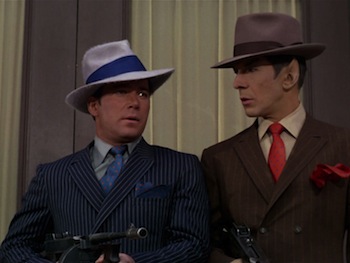
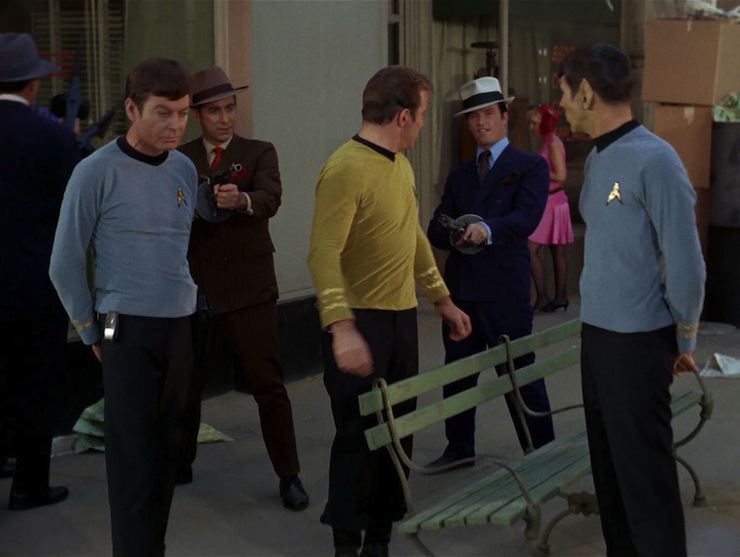
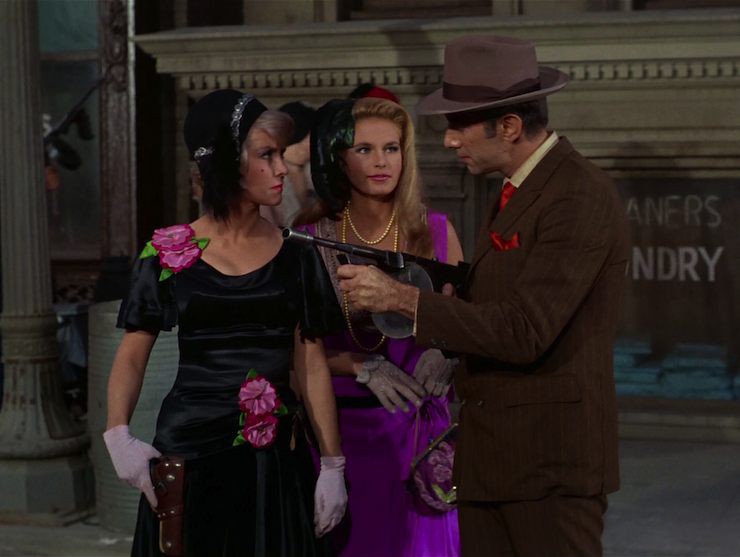
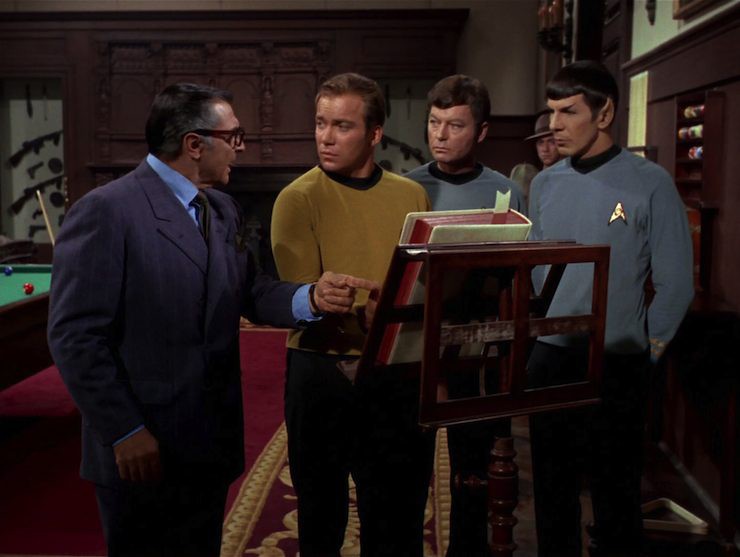
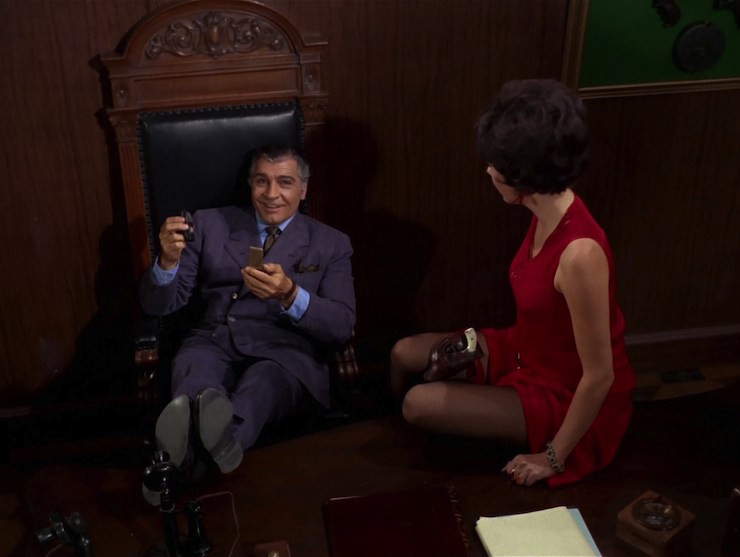
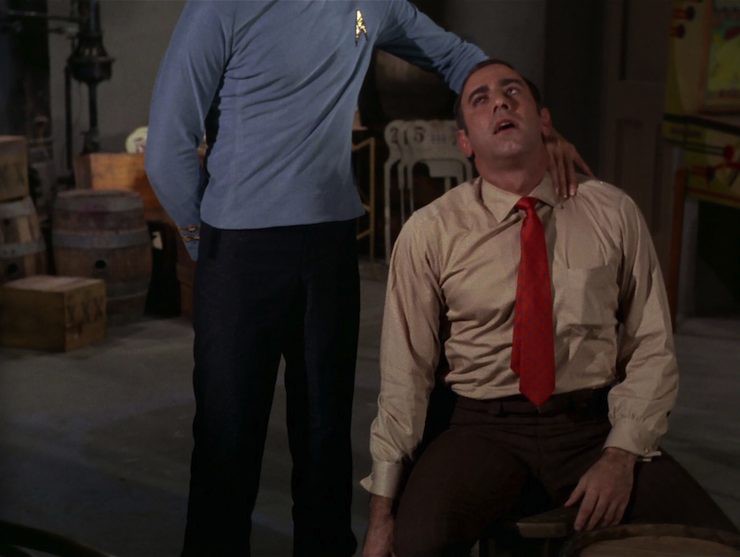
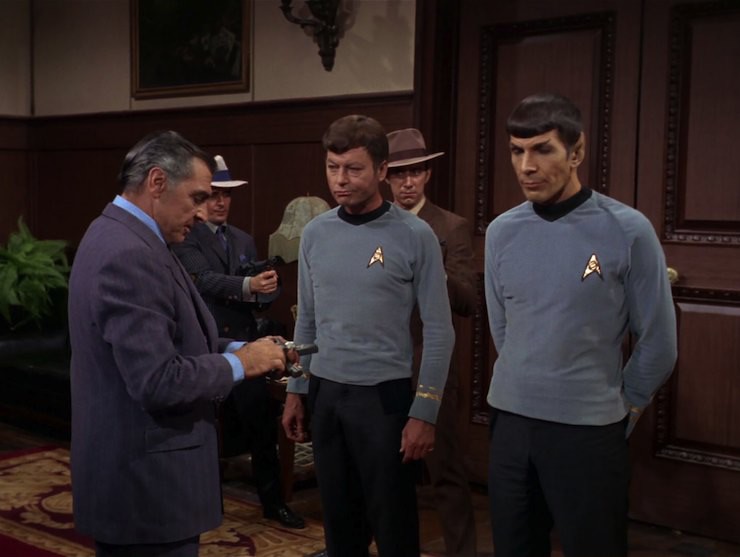
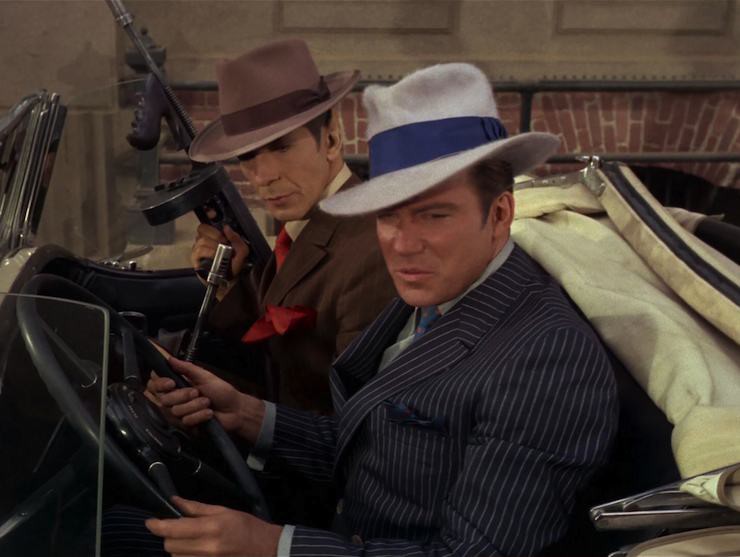
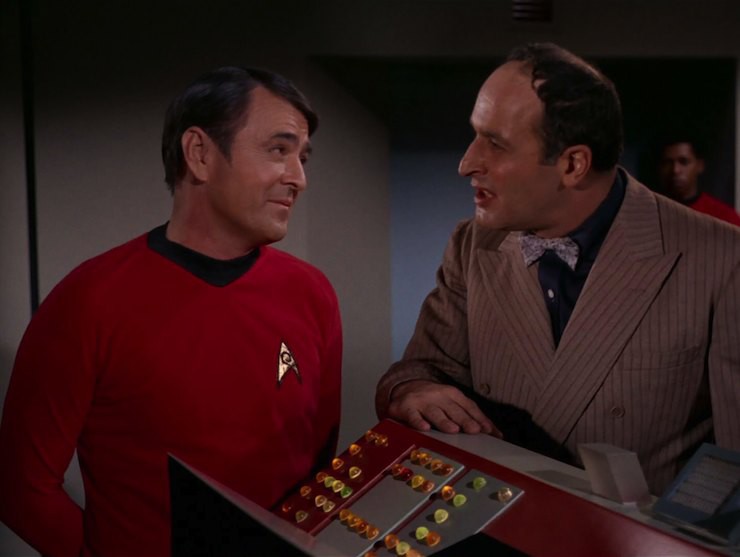
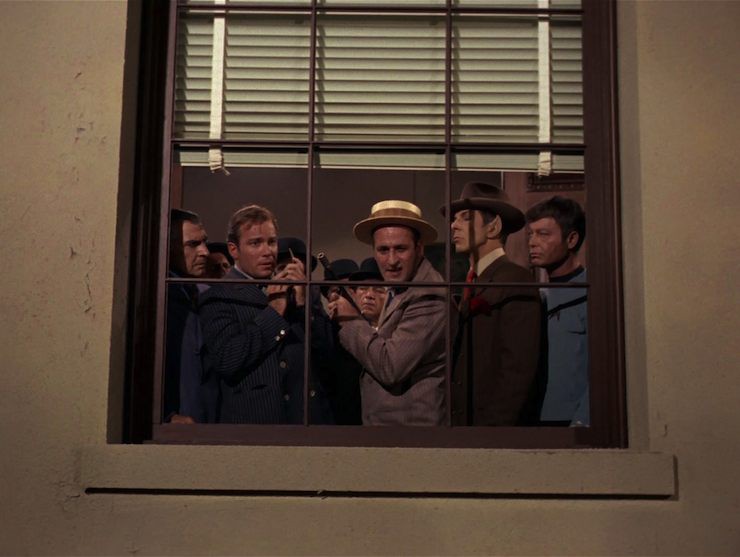
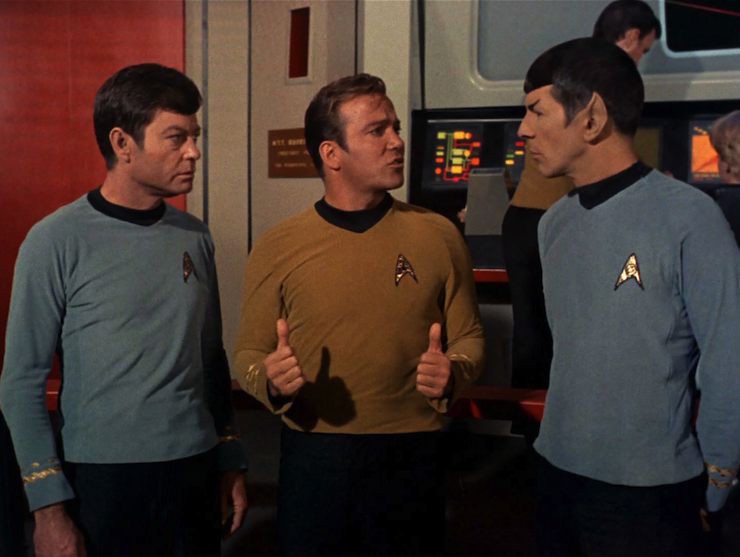
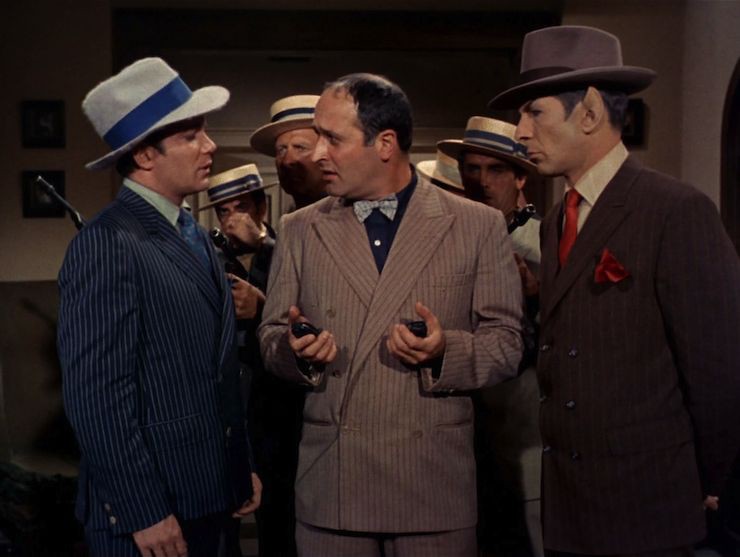
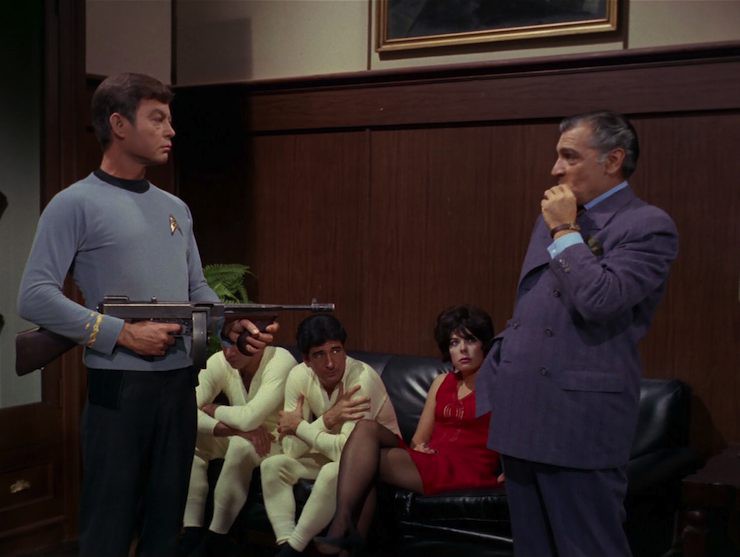
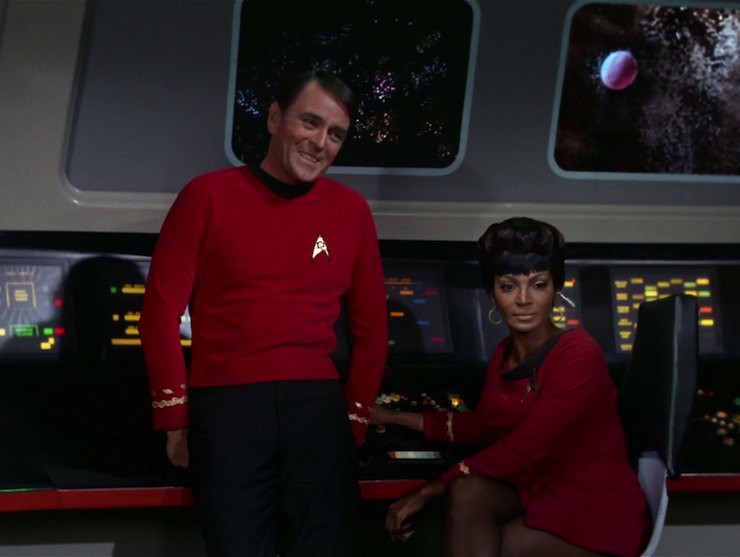
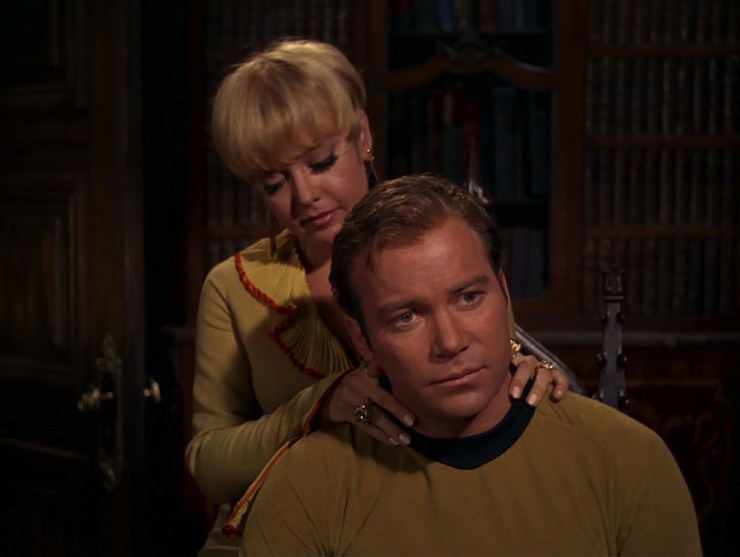
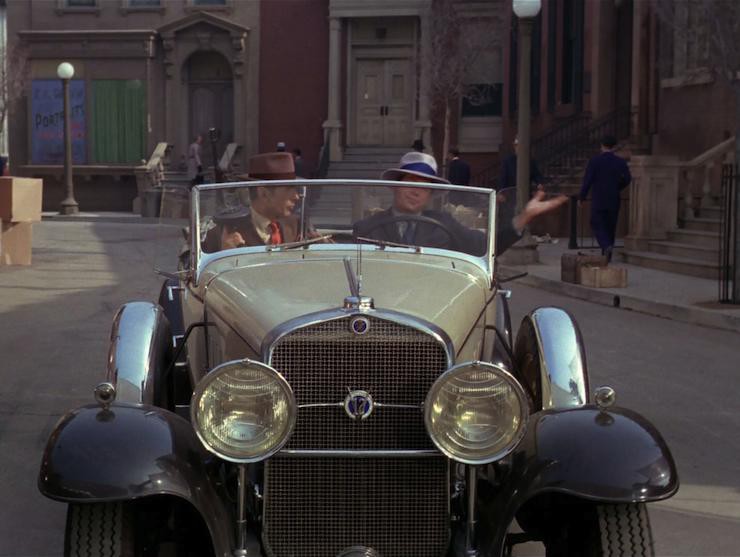
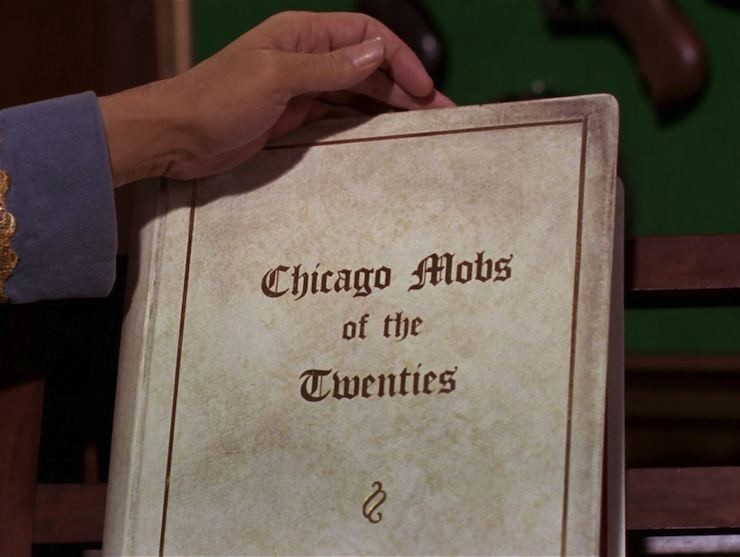
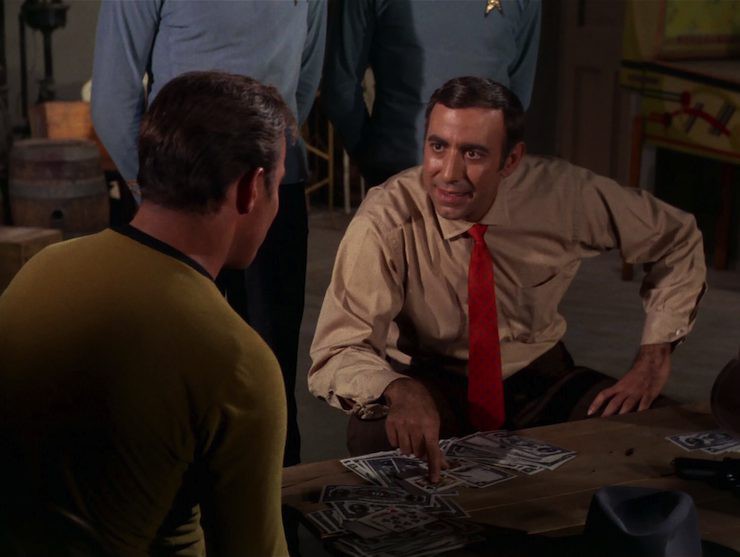
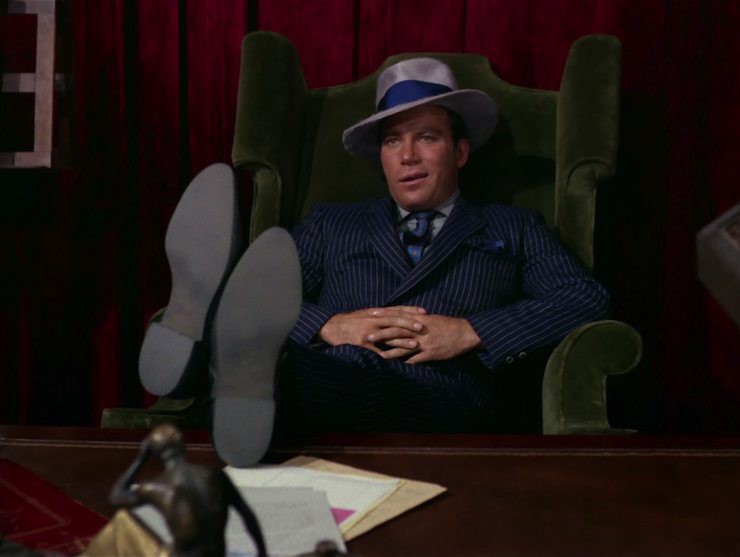
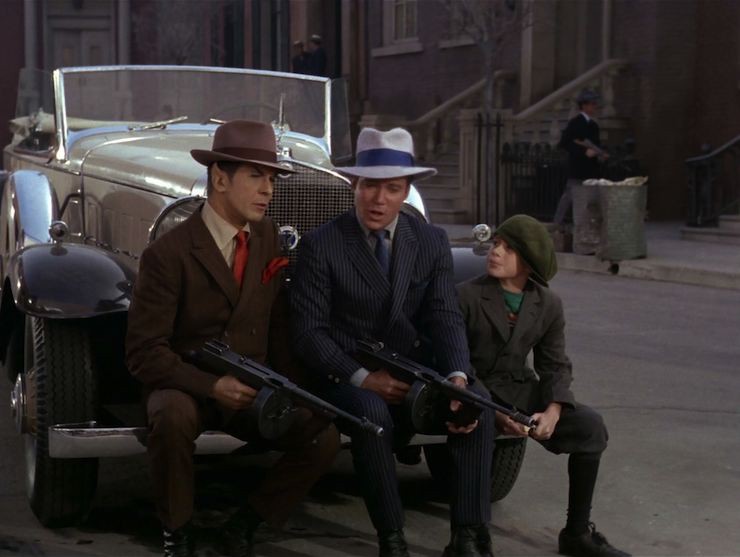
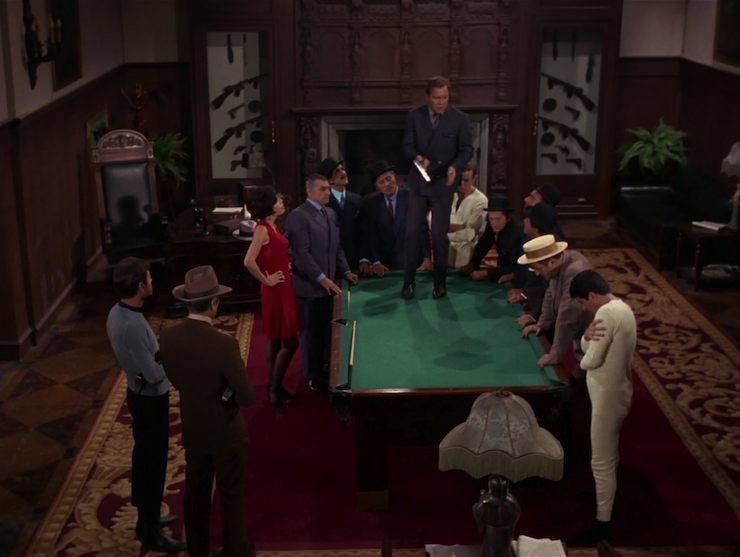
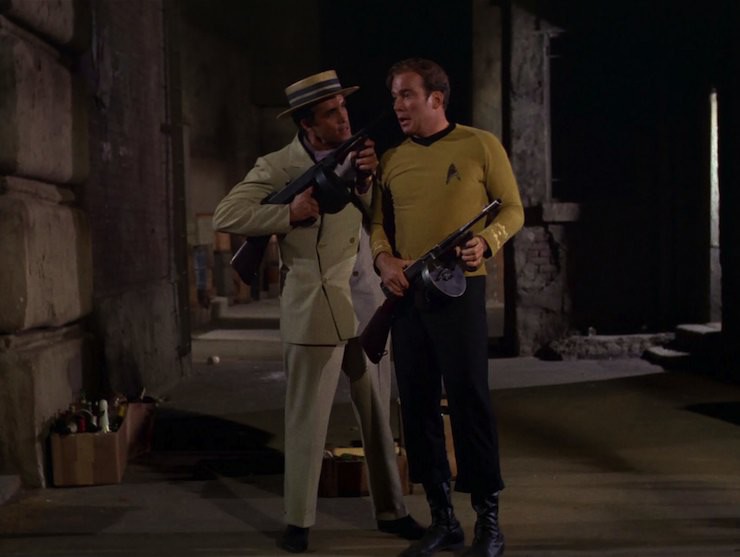
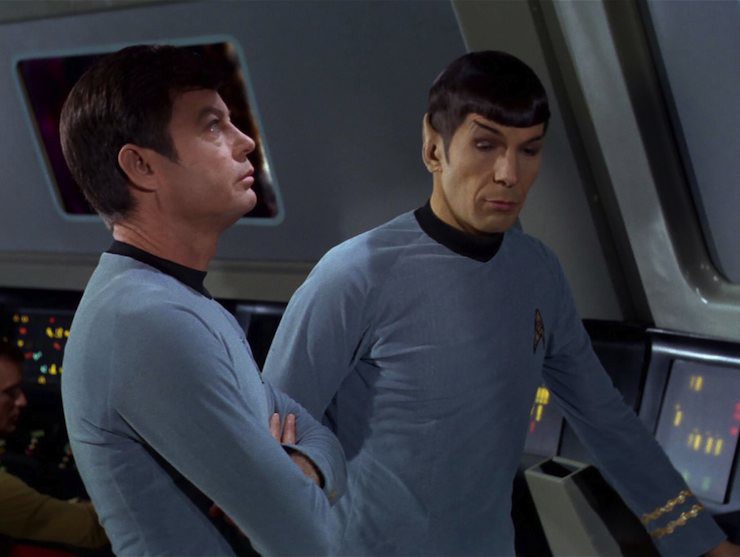
I know I’m in the minority here, but I think this is a funnier episode than The Trouble with Tribbles. The Fizzbin scene by itself is funnier than anything in Tribbles.
I love this episode. I find it hilarious. The scene where Spock would rather walk than submit to Kirk’s driving is great. This is one of my favorites.
@1/SeanOHara: I’m entirely with you!
It’s worth noting that Desilu had produced The Untouchables, the ’50s TV series starring Robert Stack as Elliot Ness. So the fact that Desilu had all this Chicago-gangster paraphernalia in its warehouses was no doubt a driving force behind the creation of this episode. (Although I’m not sure if Roddenberry had already teamed up with Desilu when he wrote the “President Capone” pitch in his 1964 series prospectus.)
The hardest thing to believe about the episode is that they were able to replicate not only the forms of the gangster era, but all its technology and infrastructure — cars, guns, radios, phonographs, not to mention all the architecture and fashions and musical styles — based only on Chicago Mobs and a few books on electronics and such. Maybe the Horizon left more behind than the century-old legends let on.
The episode is fun, but there’s one thing that makes it fall short of greatness: its use of stock music recycled from other episodes. If ever a Trek episode demanded an original score, it’s this one. I would’ve loved to hear Fred Steiner or Gerald Fried do a jazz-styled score for the Iotia scenes. The recycled cues from “Mirror, Mirror” and “Friday’s Child” and “The Trouble With Tribbles” and so forth just didn’t supplement the story as well as an original score would have. Back in ’06 when they were doing TOS Remastered and upgrading the visual effects, I wished that they would hire Fried or Steiner to compose the kind of score the episode should’ve had all along. No such luck, though.
I was very disappointed when Pocket Books failed to publish an actual book called Chicago Mobs of the Twenties in 1992. That could’ve been a great stealth tie-in — do an actual, legitimate nonfiction book with that title and subject, publish it that year, and leave it to the Trekkies to geek out on their own while everyone else just misses the joke altogether.
Ok, that is my favorite comedy episode. I too find it more funny than Tribbles, and I really wonder how they managed to do it all with straight faces, the whole episode is so absurd in a good way. Gangster movie stereotypes really work, and slang mishaps are funny as hell. Poor Scotty! And it’s one of the funniest things how Kirk is able to bluff his way in and out of everything, adapts to the slang and behavior in no time at all and like totally fails at something so mundane as driving. Makes the whole situation believable too because being from 23d century he’s probably seen such cars in history books a couple of times and that’s it, so how would he know what to do with one? That’s one thing time-travel story writers generally tend to forget.
Another thing that cracks me up is half-annoyed half-exasperated face Kirk sometimes adopts looking at his companions, like “guys, you are no help. At. All.” (this rewatch made me notice that Shatner actually rocks at comedy) And of course Spock! who is so bravely fighting this most illogical situation. So well done by Nimoy!
Fizzbin scene is one of my favorite scenes in TOS.
Of course, the whole episode looks half sitcom and half parody, so I think if someone doesn’t like this type of humor it can fall flat. But I personally found it hilarious the first time I watched and still love it after many rewatches.
I think this episode is masterfully done for what it is. That said, it makes me grit my teeth. I’d like to see it from the perspective being wonderfully absurd, but it just doesn’t work for me. I know it was done to reuse the scenery and costumes, that’s fine. But you’ve got to have a stronger story for that to actually work. It feels less The Untouchables and more The Three Stooges. “Aw, a wiseguy, eh?!” I’m used to quality stories from Star Trek, and if you’re going to give me a romp, our heroes should at least not be so Keystone Cops about it.
I do, however, like that the tough-guy kid now has a picture of him with William Shatner on the website for his dental practice.
A couple of things.
I don’t recall where the Iotians said they knew of “the Federation” IE the “United Federation of Planets” or what ever it was called at the time. I think what happened was that Kirk said that they were the Federation and the Iotians knew of “the Feds” from the book (as in US Federal agents – “G-men”) and they knew they were a power outside the gang system, and that knowledge dovetailed with Kirks declaration as to just naturally slot them culturally into the “Feds” role.
As for the phaser pistols, I seem to recall that one variant of the Phaser Mark II pistol was that it was an amplifier and extended power source for a MK I hand phaser, and that the hand phaser Mark I actually fit into the the pistol body.
that’s what I have in one of my Old Start Trek Blueprints books. Krako could just have tried taking the pistol apart in trying to figure out how it worked but go stimied by the tech to go much further.
I love this episode but the setup is so bad.
The Horizon crashes there 100 years ago, Kirk shows up and cold-calls Oxmyx, who knows nothing about the Horizon. So Kirk beams down and violates the Prime Directive. If Kirk hangs up and leaves, all Oxmyx has is some rando who called him up and asked silly questions.
@ChristopherLBennett Just a funny thing – after reading your comment I realised that I never notice the music. I won’t even be able to tell one theme from the other or if something is reused, I just completely blank it out without even noticing. Maybe the creators just decided that general public is mostly like that and that’s why they didn’t bother with special themes except for “important” episodes?
I can’t resist pointing out that a hardcover edition of Chicago Mobs of the 1920s makes a cameo appearance in one of my Eugenics Wars novels. (I believe Roberta Lincoln uses it to clobber somebody during a fight in a bookstore.)
@8/Ragnar: The Horizon didn’t crash — it made contact, left the books behind, went on its merry way, then disappeared shortly thereafter. And Kirk’s mission was to assess the degree of disruption to the culture, which turned out to be plenty. As Spock said, “The damage has been done… We are here to repair it.”
@9/Darr: The show only had the budget to commission about 9-12 original scores per season, some of them partial. It was usually more about where they were in the season than what they were about — they’d want to do a bunch of original scores in the first part of the season so as to build up a library of material they could recycle over the rest of the season. (Musicians’ union rules prohibited reusing music from a previous season, unless it was newly re-recorded.) Then they’d do scattered scores later on in the season as they could, but not always according to a clear pattern.
As it happens, there was a fair amount of original music commissioned for late season 2. The very next episode after this, “By Any Other Name,” has a new partial score by Fred Steiner (and the same recording session was used to do the “Star-Spangled Banner” arrangements for “The Omega Glory”). The one after that, “Return to Tomorrow,” had a full score by George Duning — who also did six and a half minutes’ worth of Nazi marches for “Patterns of Force” at the same session. If they could do those, I don’t see why they couldn’t have done a few minutes of jazzy/gangstery stuff to punch up “A Piece of the Action.”
Didn’t this episode owe something to the Hoka stories by Poul Anderson and Gordon Dickson?
I like this episode in the same way I like TNG’s “Royale” episode. It’s just so absurd and over-the-top and full of cheesy dialogue, with the intentionally hokey alien look at an era from Earth’s past. And yes, I would enjoy it if the Enterprise visited a Three Stooges world too. Nyuck nyuck.
If I’m recalling correctly, Oxmyx brought the Federation’s accumulated cut to his appearance as a witness in The Trial of James T. Kirk, which even further embarrassed Kirk. Also, I believe I recall they couldn’t get likeness rights for Oxmyx, thus he ended up looking in that story very much like Julie Schwartz.
My all-time favorite piece of the Trek action!!! Cheesy? Aye. Over-the-top? Aye, aye. But, damn, was it fun watching Kirk make up rules for Fizzbin and then conveniently forget them three seconds later when the exact situation he said Kelo didn’t want to happen, happened. I’ve always wondered if that was scripted or if Shatner and the actor playing Kelo were ad-libbing the scene. And “I would advise yas to keep dialin’, Oxmyx” is the single most-priceless line in the entire series.
@ChristopherLBennett #4 Yes, absolutely…I do indeed concur wholeheartedly with your disappointment over nobody capitalizing on a ready-made marketing opportunity in 1992!!!!
One thing the Chris Pine Kirk has over the Shatner one is that he actually knows how to drive… more or less.
@16/Theo16: I assume they both know how to drive a 23rd century car.
Kirk: What do you think we’re here for? To get a cut of your deal? Forget it, that’s peanuts to an outfit like the Federation! Right, Spock-o?
Spock: Unquestionably.
Kirk: RIGHT??
Spock: Riiiiiiiiigght!
I think that the most unfortunate consequence was not leaving behind a communicator but leaving behind all those nifty threads and fedoras. A big improvement over Federation wear, they would have made.
Theo: the car Kirk drove in the 2009 film was a far cry from a flivver, which is much more complicated to operate.
—Keith R.A. DeCandido
This is one episode I always enjoy rewatching. It’s absurd to the extreme, but it’s also insanely fun. A Piece of the Action never takes itself remotely seriously. That’s why it works so beautifully. Doohan seems to particularly enjoy himself as Scotty in this one. Every scene of his clicks.
I never get tired of hearing these gangsters refer to starfleet phasers as heaters (though for the longest time I thought they meant to say “hitters” instead). This is how you subvert the entire concept of contaminating cultures and make fun of the prime directive. Of course there wasn’t any other way to do this other than pure comedy and farce. It wouldn’t work as a serious piece. And if this crew lived by the principle of non-interference, TNG style, Kirk would have beamed away with Spock and McCoy the minute they had the chance. Forget about snatching Oxmyx. Then again, there’s a story to be told. Of course they’re going to try and rectify the Horizon’s mistakes.
I believe that musical piece that plays during the Kirk/Spock car scene is the same one that plays when Cyrano Jones collects the Tribbles.
@19/krad: Also, the car in the movie was owned by Kirk’s uncle, whom his mother went to live with after George Kirk’s death. In the original timeline, George didn’t die, so Kirk would never have gone to live with his uncle and wouldn’t have had the same opportunity to become familiar with vintage automobiles early in his life.
@20/Eduardo: I always knew it was “heaters,” because I had The Star Trek Concordance, and it had a handy index of Iotian slang.
And non-interference wouldn’t mean just abandoning the planet, because it had already been disrupted by humans. We don’t know much about what their culture was like before, but it’s doubtful they were as violent and corrupt as the system “the Book” inspired them to emulate. So a lot of Iotians were suffering and dying because of human interference. Just pulling a Schultz (“I see nothing!”) and walking away would completely violate the spirit of the Prime Directive. The Iotian gangster culture was humanity’s fault, and so the Federation had a moral obligation to try to undo the damage.
This is why TNG’s take on the Prime Directive was often so cowardly and morally corrupt. It wasn’t meant to be an excuse to avoid responsibility entirely. It wasn’t meant to be some rigid, inflexible code that spared people the need to actually make moral choices. It was meant to be a reminder of our fallibility, a recognition that we don’t automatically know what’s best for other cultures. So it’s in keeping with that same spirit to admit the mistakes we have made in the past and try to make amends for them, rather than just walking away with our fingers in our ears.
@19 That “flivver” Kirk is trying to drive was a 1931 Cadillac with a V-12 engine, one of the most powerful and expensive US luxury cars at the time. Nowadays, open-bodied models like the one in this episode have sold at auction in the six-figure range.
Consequently, Kirk’s noisy attempts to shift gears (no syncromesh in those days) make me cringe.
I love this episode, but that’s cause I always like seeing Tommy guns. And instead of Kirk tricking a computer with logic or human feelings, he tricks gangsters with a card game!
@16 – Theo16: Yeah, and Abramsverse Kirk would have aced driving that car.
@13 – Sketchy: Yes, The Royale in first season TNG is not a remake, but it shares a lot with this episode.
@23/lordmagnusen: Keep in mind, in the movie scene, young Kirk drove the car off a cliff in a rock quarry and utterly destroyed it. I think that scene was meant as a sort of homage to his reputation as a lousy driver, as established in this episode.
Giving Shatner another chance to chew scenery….Well, at least this one was fun. My son and I watched one TOS episode per week (Netflix) for a year and half. The ‘sweetened’ special effects definitely affect the story. Slightly distracting when the enhanced CGI is pushed on to the old memories.
This episode, Tribbles, Shore Leave and I Mudd are definitely ones where they purposely injected more humor. I wish more shows could do that today.
@16, @22
Very true, a 1931 car would definitely be a lot more complicated to drive than a 1965 Corvette with automatic transmission.
Besides the crash gear box — no syncromesh means double-clutching on downshifts — the 1931 car would have had a manual choke. Presumably the engine was still warm; otherwise Kirk couldn’t have started it without setting, and later, adjusting the choke.
Cars of the 1930’s and 1940’s didn’t necessarily have obvious means to crank it. Besides an ignition key in the dash, some cars had the starter button hidden under the accelerator pedal. To crank the engine, you mashed the accelerator all the way down. Don’t know if that’s true for this particular model, but the point is, driving it would be difficult by today’s standards, never mind someone from the 23rd century.
In terms of Young (Reboot) Kirk driving versus Classic Kirk driving here, I think of my realization in recent years of having utterly lost my ability to parallel park (having lived in the suburbs basically all my life), such that I only even parallel parked in the first year after my driver’s test. The idea that Kirk learned drive a twentieth-century car as a teen in the Midwest – regardless of timeline – makes sense, with a difference that the reboot timeline probably gave him more experience (I can picture original-timeline Kirk visit his uncle’s as a teen and getting a little driving practice in the antiques, but then returning home). So, his idea that he’s still remember twenty years or so how to operate them, regardless of still have the muscle memory (similar to my issue with parallel parking) is a sound one – Spock almost certainly has never driven something akin to a 1920s car and wouldn’t have the technical knowledge of its operation, even if his better motor skills might come in handy if he did.
As absurd as TOS could get at times, I think I like its one-off alien worlds more than the later Star Trek series. They were more fun anyway. Most of the planets we see in TNG, and on, seemed to be either futuristic 20th century or in the Renaissance. TOS was more like a theme park. Step right up! We got Gangster World! Nazi World! Roman World! Greek World! West World! Just several of the many awesome things a limited budget can get you. :)
Though you really have to wonder what an early starship was doing carrying around an obscure old, family Bible-sized, reference book like that, don’t you? Now there’s a story for one of you Trek writers to fill in the blanks on . . .
Back to the Future managed to do this in a couple of cases. “Pepsi Perfect” came out when the movie predicted it would, and Nike made the Nike Mag shoes from the sequel. Of course these went for an average of over $3K a pair at auction for Michael J. Fox’s Parkinson’s charity; I’m not sure Trek fans would pony up that kind of dough for an inside joke.
Lots of other shows mix humor in at various levels, but are pretty consistent about it rather than having a “comedy week”. On the other hand the recent X-Files reboot threw in a pretty funny monster episode in the middle of a mostly-grim arc, so it’s not completely lost.
@29/sardinicus: Enterprise already covered the origins of The Book, implicitly. The Horizon was the Earth Cargo Services freighter on which Travis Mayweather grew up, and he had a shelf full of books, including one that the prop makers labeled Chicago Gangs of the Twenties but was clearly meant to be Chicago Mobs of the Twenties. The Enterprise novel Kobayashi Maru by Michael A. Martin and Andy Mangels shows the Horizon just after it leaves Iotia and explains how the contamination happened (it was Travis’s brother who left the books and other historical artifacts behind). It also explains how the Horizon was unable to send a subspace radio message despite Enterprise establishing that the technology existed at the time, as well as explaining the ship’s fate.
So here we have the plot element of a first-contacted culture that is so imitative that it adopts whole hog the cultural patterns (dress, speech, etc.) presented by the contactors. (Though, I realize in “Piece” the cultural influence is from a book they brought.) My question is, is this a trope that has been seen in multiple stories? Because I first encountered this plot element in Carl Barks’ 1949 classic Donald Duck comic, “Lost in the Andes.” A lost society in the Andes stumbled onto by Donald Duck had adopted the speech patterns etc. of an earlier visitor from the American South. Also, with reference to the Shane Johnson book where the people post- “Piece of the Action” adopted Starfleet uniforms and lingo….Don Rosa wrote a sequel to “Lost in the Andes” in 1989 where, on the Ducks’ return, they find that the society is now imitating Donald Duck. Not that I’m claiming influence in one direction or the other—Johnson’s Worlds of the Federation came out in 1989, too. I’m just wondering whether this “imitative culture remade after first/second contact” has shown up in other places.
For what it’s worth, I also find this episode funnier than “Tribbles.”
@31/Saavik: I don’t know about such specific examples, but it’s a variation of the well-worn “cargo cult” trope (which is loosely inspired by reality, but a misinterpretation of the dynamics behind the practice).
@29/sardinicus,@30/CLB: As for the question of why they had that book in the first place, according to Kobayashi Maru it was because Travis’s mom’s family was originally from Chicago and she had a lot of interest in the history of the city; she kept the book less for reference and more for sentimental value, and one of her crew accidentally traded it away with the various other cultural items they traded to the Iotians in exchange for repairs.
30/CLB — I guess I have to watch Enterprise one of these days.
31/Saavik – Donald Duck also, rather famously, also did Inception first.
Always wondered what happened to Iotia by the time of Next Generation. Still doing the gangster thing, imitating early 23d century Star Fleet, some unholy mix of the two? Or, like the Hokas, did they find some entirely new enthusiasm to imitate?
@35/BMunro: Someone has to come by once a year to collect the money. I imagine the Federation would use those occasions to nudge the Iotians toward a less gangster-y form of government.
Any sequel involving Sigma Iotia II’s society would have to involve the Ferengi in some form. This really should have been done during DS9. Imagine the possibilities in Quark’s attempts to make a profit out of the situation.
Alrighty, KRAD or CLB: we’ll all be really disappointed if something like this doesn’t see print within the year!
As I said in the Trivial Matters section, the Starfleet Corps of Engineers series has an Iotian security guard on the U.S.S. da Vinci named Makk Vinx. He first appeared in The Demon Books 1 & 2 by Loren L. Coleman & Randall N. Bills (which is reprinted in the trade paperback Aftermath), and also appeared in Failsafe and Small World by David Mack (reprinted in, respectively, Grand Designs and Creative Couplings), Fables of the Prime Directive by Cory Rushton, Security by me (both reprinted in Wounds), Out of the Cocoon by William Leisner, Blackout by Phaedre M. Weldon, The Cleanup by Robert T. Jeschonek (all reprinted in Out of the Cocoon), Turn the Page by Dayton Ward & Kevin Dilmore, Signs from Heaven by Weldon, and Remembrance of Things Past Books 1 & 2 by Terri Osborne (those last only available as eBooks).
—Keith R.A. DeCandido
Fables of the Prime Directive also touched on the direction the Iotian society went after this contact as well (if this excerpt is too much, I’ll cut it down, but I think it’s short enough that it’s not an issue – credit to Cory Rushton for writing it, of course):
All in all, a silly, fun romp that raises questions that really don’t have answers. For example, aren’t we just counting on the Iotians embracing one form of society for another, regardless of the intentions? Are the Iotians actually choosing what’s best for them or what the Federation decides is best for them?
MCCOY: Yeah, well, Oxmyx is the worst gangster of all.
SPOCK: We may quarrel with Mister Oxmyx’ methods, but his goal is essentially the correct one. This society must become united or it will degenerate into total anarchy.
Didn’t Kirk simply create a dictatorship? He put Oxmyx in charge of the other bosses even though they acknowledge he’s the most powerful and dangerous. He didn’t get where he was by being the nice mobster. It would be like putting Kim Jong-un in charge of Earth because he believes that it should be united, with himself as supreme leader.
It’s been 100 years already. Surely the Iotians have put their own spin on things. Do we really need to come in, after a century, and say “Whoops, we bad. We’re going to totally change your culture.”
The original change wasn’t imposed from outside. The Iotians decided to base their own culture on The Book. Kirk, on the other hand, used threats of force in order to “undo” what he saw as a mistake. After all, showing you have the ability to stun everyone on s the street is pretty much saying “You can’t stop me anyway so you might as well do as I say.”.
In the end, it’s a comedy episode. It’s the TOS equivalent of a popcorn movie. Kick you feet up, enjoy the ride and don’t think about it too much. It may not make a lot of sense but it sure is a lot of fun.
“concrete galoshes” <Snarf!>
@kkozoriz: As you say, it’s a comedy; in a serious episode they might have done things a little bit differently.
Still, I don’t think it’s as bad as you make it sound. Kirk doesn’t set up Oxmyx as sole ruler, he gives him Krako as his lieutenant. Oxmyx himself calls it a syndicate. And that’s only the first step – as Kirk says to Spock in the final scene, the money the Federation gets should be “used to guide the Iotians into a more ethical system”. So things will probably change over time, in small steps.
Also, they’re pretty harmless gangsters, aren’t they? They don’t do anything really nasty except killing one man in a shooting right at the beginning. Of course that’s because it’s a comedy, but I think it also makes sense in-universe – those “bosses” aren’t all that greedy, or power-hungry, or murderous, it’s more that they go through the motions because they think that’s what an advanced society looks like. Which is why it is relatively easy for Kirk to win them over in the end.
I like the idea that the Iotians become a Federation member but keep their gangster slang.
But, more important than any of this: Whatever happened to the boy who created the diversion (and the episode title)? Did he get paid at all, or did they just forget about him? Now, that would have been really mean!
Interestingly, Kirk’s putting Oxmyx in control has some precedent in New York Mafia history when Lucky Luciano united the Five Families into the Commission. Before he did such a thing, the New York crime families were always at war with each other, threatening the city’s peace (and innocent lives), and disrupting the sale, hence the profits, of illegal contraband. So sometime in the early 1930s, he gathered the Bosses, the Consigliere’s, and the caporegimes of each of the families together to create a “government” of sorts based on the way the mafia was run in Sicily. This is where Cosa Nostra came in as a term to refer to the American Mafia. Then Luciano set himself up at that meeting as the capo di tutti i capi, or Boss of all bosses and he pretty much ran the crime (and hence the City) of New York even until the 1950s (and that’s including running the crime from 1936 to 1946 from a prison cell in SingSing and filtering all orders through Frank Costello who became ‘boss’ in almost name only, and from 1946 and 1947 from a hotel room in Havana after being deported). Just an interesting historical tidbit.
@@@@@42. JanaJansen –
Yes, a more ethical system but who’s ethics? Apparently the humans. But the Iotians aren’t humans, even though they look exactly like us. Should the Federation just give them a selection of documents that have been used by different civilizations and see which one they choose? US constitution? Canadian? Magna Carta? The Bible/Koran/Torah? Findamental Declaration of the Martian Colonies? The writings of Surak? Of Kahless? Or, in another century, The Rules of Acquisition?
Haven;t they already established a culture after a century? And, as you say, they don’t seem to be particularly violent gangsters. Who’s to say that what the Federation replaces them with won’t turn out even worse?
Imagine if it was discovered that the US constitution was the result of Thomas Jefferson being inspired by a document from the future (Kirk and time travel, don’t ya know). Would the Federation travel back in time to see that America remained a monarchy?
If Oxmyx and the other bosses seem to be keeping a lid on most of the inter-gang violence, would the Federation decide that the gangster civilization is working and just leave it be? Or would they insist that they become a democracy? Look at Donald Trump. Democracy doesn’t mean that things will necessarily be better. Even Hitler was democratically elected.
And how can you tell if the Iotians honestly believe in the system you propose and they don’t just see it as another form of planet wide cosplay? Remember Kirk mentioning Nightingale Woman to Edith Keeler? If someone of the Federation Cultural team just mentioned that to an Iotian and let them read it, they might decide to base their entire civilization on that instead. The Feds won’t be able to talk about any outside cultures without the possibility that the Iotians would latch onto that as a basis for their civilization.
@44/kkozoriz: Giving the Iotians a selection of documents to coose from is a good idea.
Also, I didn’t mean to say that the Iotian gangsters aren’t violent – of course they are, we see a man getting killed in the beginning, and then there’s all that talk about “hits” – but only that their heart isn’t in it. So leaving the same people in charge and just stopping the fights between them isn’t the same thing as “putting Kim-Jong un in charge of Earth”.
But how far should the Federation go in choosing which documents to share? What if they choose to follow the Klingon example? Or the Gorn? Or the Tholians? Who’s “ethics” does Kirk think that they should base their society on? Obviously, he’s assuming somehing like the Federation (i.e. the liberal part of mid/late 20th century America.) Suppose they decide that, like John Gill, the Nazi’s have some redeeming qualities, if only you can use some but not the others.
The problem is that the Iortians are mimics of excruciating detail. You’d have to keep huge swaths of human history from them just in case they decide that one of the darker periods in our past sounds like fun. I don’t recall seeing any black Iotians but I doubt they’d appreciate being declared 3/5 ths of a white Iotian.
You couldn’t even give them comic books for fear of them deciding to emulate Lex Luthor or the Joker.
@44/kkozoriz: OK, this is nitpicking, but: Kirk doesn’t mention “Nightingale Woman” to Edith Keeler, he mentions a novelist who values the words “Let me help”. (Which might be a good thing to base a civilization on, compared to, say, “Chicago Mobs of the Twenties”.)
@46/kkozoriz: If you give someone a choice, you may not like the thing they choose. That doesn’t make it wrong to let them choose. The Iotians didn’t really choose the gangster society, they kind of imprinted on it. That’s the damage Kirk tries to repair.
Oh right. My mistake. But anyway, he’s still mentioning alien literature. Like Shakespeare, you can find things that speak to our more noble sides but there’s also bits where everyone ends up dead at the end.
I just have trouble with the episodes where the Federation feels that the way to correct for past meddling is to meddle even more. Because that’s worked out so well on this planet in the Middle East.
Well, that’s one of the recurring problems in TOS. Even with the Prime Directive, they resorted to 1960’s-style meddling way too often.
Don’t get me wrong. I love TOS (and it’s not like the later series didn’t have recurring problems of their own), but in this specific respect it didn’t age too well.
48. JanaJansen – The Iotians didn’t really choose the gangster society, they kind of imprinted on it. That’s the damage Kirk tries to repair.
But that’s the exact problem. They did choose the gangster society because that’s what they naturally do. How are you going to “repair” the “damage” when the Iotians can, and most likely will, simply become imprinted with whatever replacement society you introduce them to. At least the last one was inadvertent. The new one will be the result of deliberate action steering an alien society into one that the Federation decides is more “ethical”.
Also, it’s been 100 years. If they’re as human as they appear, that’s 5 generations. The majority of people on the planet have never known any other society than the ones they’re now living. So the Federation is going to come in and tell them that they have to change their entire way of life because they were wrong in interfering in their culture a century ago? Where’s the logic in that? “We made an innocent mistake years before you were born so now we’re going to deliberately introduce the sorts of changes that we never should have introduced you to in the first place?”
Sure, establish relations with them. Let them know about The Federation and the galaxy beyond but leave them to work out if and how they’ll join the rest of the galaxy. The idea that it’s up to the Federation to decide who’s “ethical” and then take action to change it is the exact opposite of what the Prime Directive is stated as being. The whole “But we’re repairing the damage” is just misdirection. The Iotians are so good at mimicry that now matter what you introduce them to there’s a very good chance that they’ll glom onto it in the same way the did with the gangsters. Then the Federation finds itself in the role of the Galactic MPAA, censoring everything that the Iotians are exposed to.
@51/kkozoriz: I think we already discussed two good ideas. One of them is Kirk’s – introduce (relatively) minor changes. Leave the same people in charge, leave their way of thinking (mostly) intact, merely stop the nasty aspects of their way of life, i.e. the killing. The other one is yours – give them a variety of models to choose from. (I’m not sure if it was supposed to be a real suggestion, but I like it.)
Concerning the more general issue of your post, namely helping vs. noninterference, or who decides what’s ethical, that’s going to be a longer comment, and I don’t have the time for that right now. I’ll try to do it later.
The thing to understand, the thing that Prime Directive stories often overlook, is that there’s a difference between interaction and interference. The myth, perpetuated by such execrable episodes as TNG: “Homeward,” is that simply knowing about more advanced cultures will automatically shatter a culture’s cherished beliefs and cause it to collapse. But that’s crap. The pretense that the damage is automatic is an excuse to absolve the West for its deliberate and systematic attempts to eradicate indigenous cultures in the 18th-20th centuries. The fact is, cultures are robust and adaptable things. Change is not an abnormal or unhealthy state for a culture. Cultures interact with and learn from other cultures all the time, and the most dynamic and successful cultures are the ones that have the most outside contact. Having more ideas to play with is good — as long as a culture has the freedom to make its own decisions about what to do with those ideas. Which ones to accept and learn from, which ones to reinterpret to fit existing understandings, which ones to discard as irrelevant or unwelcome. The damage comes when outsiders try to force a culture to adopt outside view, through conquest or missionaries or economic manipulation or whatever. As long as a culture is free to direct the interaction and choose how to handle it, then it isn’t automatically harmful.
It’s like the difference between being a friend and being an abuser. Friends don’t keep their distance and refuse to interact with you; they’re there for you if you need them, ready to contribute their thoughts and offer their help, but they respect your right to disagree or decline their aid and make your own choices. It’s only when a relationship becomes controlling, when one partner goes beyond offering suggestions and begins dictating to the other partner how to live and how to think, that it becomes harmful.
So the Prime Directive is supposed to be about preventing abusive relationships between cultures, not to prevent all relationships. Generally contact with less advanced or pre-warp civilizations is discouraged for fear that the power imbalance is too great for a healthy relationship to be possible, but that’s a safeguard. It doesn’t mean every contact is guaranteed to go badly, it just means you need to be very, very careful about getting into such situations.
Iotia is a situation where the contact happened before those principles of carefulness came along, so the relationship already exists, up to a point. The goal is to proceed while still letting the Iotians make their own decisions. And it is possible to offer advice and guidance without imposing control. That’s what Kirk is trying to do. He’s not forcing a change on them; he’s advising and encouraging them to make that change for themselves. Oxmyx and Krako both talked about wanting to unite the gangs and solve their problems, but they couldn’t see a path to do that. Kirk found a way to make it happen within the parameters of the code they’d adopted. He adapted his approach to their society as it currently exists, and he’s given them a way to achieve reform under their own rules and in a way that makes sense to them. Which is actually quite a light-handed way of going about it, considering how imitative and pliable the Iotians are assumed to be.
Yeah, in that whole conversation, kkozoriz and JanaJansen, you’re never mentioning the fact that by the end they wanted help changing their society.
“…I’m a peaceful man at heart, but I’m sick and tired of all these hits. I hit Krako, Krako hits Tepo, Tepo hits me. There’s too many bosses. We can’t get anything done. “
Which also honestly puts the lie to “not very violent gangsters”.
53. ChristopherLBennett
“I propose our cut be put into the planetary treasury and used to guide the Iotians into a more ethical system. Despite themselves, they’ll be forced to accept conventional responsibilities.”
It sure sounds like Kirk is proposing that the Federation use it’s influence as the boss among bosses (which is what Kirk has basically set them up as) to make changes to the Iotian civilization. The Federation has already shown it’s more powerful. Kirk has essentially put the Federation in change, albeit at arms length. But he’s still advocating that the Federation set itself the goal of making changes to a society that is not a Federation member and that did not ask for help until Kirk essentially showed that he was the biggest gun on the planet.
And who’s to decide what’s a “conventional” responsibility? This is using Kirk’s own morality as the yardstick by which the Iotians are to be measured.
Another thing is that, Iotia is not the result of someone breaking the Prime Directive because the policy did not exist at that time.
Talking to the Iotians in terms they understand means you get this:
KIRK: All right! All right! All right! All right! Now the Federation’s taking over whether you like it or not. You people, you’ve been running this planet like a piecework factory. From now on, it’s going to be under one roof. You’re going to run it like a business. That means you’re going to make a profit.
And this:
KRAKO: I thought you guys had laws. No interference.
KIRK: Who’s interfering? We’re taking over.
And this:
KIRK: The Federation’s moving in, taking over. You play ball, we’ll cut you in. You don’t, you’re out. All the way out.
Hr’s not offering help. He’s telling them that they’ve got to change or else. Sure, he’s playing a role but the Iotians don’t know that and they’re assuming he’s speaking literally. It’s all played for laughs on our side of the screen but to the Iotians, it’s an outside force imposing their will upon them. This is not the way that friends deal with friends. It’s the way someone with the power exercises control over someone that can’t refuse.
There’s no breaking of the Prime Directive until Kirk decides that the Federation is taking over the planet.
And what, then, do you consider the ethical resolution to the situation?
What situation? There’s no violation of the Prime Directive, because it wasn’t in force then. A planet of people took something that was given freely to them and decided for themselves to base their society on it.
Treat the Iotians like grown ups and if they insist on acting violently, don’t have anything to do with them and leave them to their own devices.
They’re not children. They don’t need the Federation acting as a “cosmic Mary Worth” as David Gerrold calls it. If the UFP can deal with arming Tyree and his Hill People with a clean conscience, then they should have no problem dealing with people who decided to arm themselves based on nothing more than a history book. It’s not like the crew of the Horizon encouraged them to become gangsters. Nor did they show them how to make tommy guns.
Of course, that wouldn’t be nearly as funny as Kirk & Spock in fedoras, Fizzbin and concrete galoshes.
@57/kkozoriz: The ordinary Iotian people who get shot in the streets might take a different view on that than the bosses.
@29 – sardinicus: The problem with Pepsi Perfect is that it was not a calculated, sleeper tie-in inside joke that Chris is asking for with the Chicago Mobs book. Pepsi Perfect was released the same year as we saw it in the movie (not the same year it was released in the film, since we don’t know how long it hasn’t existed when we see it) because it was an overt, explicit merchandising item for the film, since 2015 was the year Marty travelled to in the film, and there were all manners of celebrations related to the franchise. Same for the sneakers, even if they weren’t made for the 2015 celebration, they were an overt merchandising item.
@@@@@58. JanaJansen – But it’s the bosses that Kirk left in control. And most of the people getting shot were gangsters working for one of the other bosses. So the real improvement in lifespan will come from the bosses and their underlings. If anything, Kirk solidified the very societal structure that he claimed as the reason for intervening. The ordinary people on the street didn’t have any say in the matter. It’s like Al Capone was solidified as the head of the Chicago mobs rather than being sent to jail. Much like A Taste of Armageddon, the people that ran the society that the Federation found so abhorrent are the ones left in control. They’re just threatened into doing what the Federation wanted them to do.
Meanwhile, the Iotians now have access to translator technology. Iotia may be on the way to being a gangster society but tie phasers instead of tommy guns, And that’s laughed off at the end. You’d think advanced technology would be more disruptive than a single historical book.
The point is that the episode doesn’t make a whole lot of sense but it doesn’t really have to because it’s purpose is to play the situation for laughs. And it succeeds well in doing that
@60/kkozoriz: Yes, it’s a comedy, so it doesn’t have to make perfect sense. And it’s really funny.
We probably won’t agree on anything else – you think that the Iotians chose their society of their own free will, I don’t think so. Therefore, you think that they should be left alone, I like it that Kirk feels responsible for them.
And nobody except me seems to be worried if they ever paid the little boy.
So let’s talk about McCoy’s communicator instead:
I don’t see the Iotians, with their early-twentieth century level of technology, reverse-engineering that communicator. Besides, they’re all friends now – Kirk and McCoy can always go back and retrieve it. They just do it after the credits.
@@@@@61. JanaJansen
How were the Iotians persuaded or forced or encouraged to base their society on The Book? There’s no indication that they were. The simply took a look at a book that was left behind and created this society themselves. They’re mimics. That’s what they naturally do. If The Book had been about ancient Rome then Kirk & Spock would have spent half the episode in togas. It it had been about the wild west, then they’re be in western wear and Kirk wouldn’t know how to ride a horse.
Kirk has no reason to feel responsible for what happened on Iotia 100 years ago because there was no force or encouragement on the part of the crew of the Horizon. If anything, Kirk would probably see it as a reason to stop breaking the Prime Directive. To stop meddling in societies that he’s barely knowledgeable of. (We all know how that worked out, don’t we?) Instead, he doubles down and forces a different change in Iotia. And how is the federation going to step in and tell the Iotians how they must use the Federation cut of the planetary treasury? How would we feel if aliens dropped out of the sky and told us that we MUST spend 40% of Earth’s GDP on a particular government program? And what effect would it have on our economy if 40% was suddenly not available to us? If the Iotians are anything like humanity, the people on the bottom of the social ladder are the ones that are going to suffer the most.
Kirk basically lied to the mob bosses, why wouldn’t he lie to a little boy as well? It’s all for the common good, right?
I don’t see the mob bosses as being friends with the Federation. I see them as being scared of the UFP’s power and, since the Federation will only be around once a year (to “collect” it’s cut), I’d imagine that the fear will eventually give way to resentment. After all, they take the lion’s share of the take and then just disappear for another year.
Since the Federation isn’t really taking their cut of the action anywhere but are instead putting it back into the planetary treasury, who, exactly decides where it’s spent? Is there going to be a Federation accountant assigned to Iotia to ensure that it’s spent on guiding them “into a more ethical system.”? Who’s ethics? Certainly nor the Iotians because that’s what they’ve got now.
@62/kkozoriz:
“The simply took a look at a book that was left behind and created this society themselves. They’re mimics. That’s what they naturally do.”
Yes, and that means they were harmed, albeit inadvertently.
“Kirk has no reason to feel responsible for what happened on Iotia 100 years ago because there was no force or encouragement on the part of the crew of the Horizon.”
But isn’t it good behaviour to assume responsibility for inadvertent damage too?
“I see them as being scared of the UFP’s power.”
I don’t. When Oxmyx claims that a syndicate makes sense to him, that he’s “sick and tired of all these hits”, my interpretation is that he either says what he really thinks, or he already starts mimicking Kirk.
Or he’s simply saying what Kirk wants to hear in order to have Kirk install him as the top boss. Which is exactly what happens. Sounds like Khan “We promised the world ORDER!”. So, rather than having different bosses, each of whom have to keep the people under them somewhat happy in order to keep themselves in power, we now have one boss and some underlings who are free to ignore the lowest on the totem pole and rule with one, unified private army.
The problem with taking responsibility for “inadvertent” damage in this case is that the Iotians could do the same for any source material. Give them the Bible and they could concentrate on the Old Testament. Give them the US constitution and they’d reveal themselves to be originalists and start taking slaves. Give them a communicator and they’ll start acting like Kirk, travelling the galaxy “correcting” everything they see as interference with alien cultures.
Of course they’re going to be influenced by outside contact. The “problem” is that the Ionians are mimics. They could decide to base their entire culture on almost anything. Or, given access to the various cultures of the Federation, they could decide to totally change their own culture with dizzying speed. They’re the “Ooohh look, shiny” people of the galaxy. Whatever catches their attention today becomes what they base their civilization on. Opening them more to outside contact could cause their entire culture to collapse and they shift from mimicking one culture to the next.
@64/kkozoriz: That’s why I liked your idea of offering them a choice of cultures to base their own on.
@65. JanaJansen – but you then have the problem of choosing which cultures. Do you offer them just Federation choices or do you include the Klingons and/or Romulans? You’re still interfering with their culture as long as you’re the one deciding which cultures to expose them to. And if they decide that Klingons sound really cool and start arming everyone with disruptor pistols, bat’leths and they start conquering nearby planets because that’s how Klingons do things? What do you do then?
“You’re free to choose how to develop your culture as long as you choose to base it on one of these examples that we’ve carefully pre-screened for you…”
If simply being exposed to an alien book was enough to totally change their culture then the only way that you can avoid further “contamination” is to simply have nothing to do with them. That hardly sounds like fun now, does it?
How would you propose preventing the Iotians from doing what comes naturally to them, mimicking other cultures?
@66/kkozoriz: The point is that it’s not about your choices, it’s about theirs. They’re not passive. It’s their world, their lives, and they have the freedom to accept or reject the ideas you expose them to. As long as you’re defining this issue strictly in terms of the Federation’s choices and agency, then you’re guaranteed to get it wrong. The point of the Prime Directive is to recognize and respect the natives’ agency over their own lives.
In a way, that’s the problem with the whole idea of the Iotians as a fictional premise — they’re just an iteration of the condescending cargo-cult cliche, the weak-willed primitives who slavishly and unthinkingly embrace the ideas handed to them by outsiders. That’s not the way it works in real life. Indigenous cultures have their own agency, and if they embrace ideas from outside cultures, that’s not “contamination,” it’s something they choose to do because it serves their own existing agendas and goals. Indigenous peoples who convert to an outside religion generally do so because they see it as a way to advance their own interests, to solidify their existing authority or to bolster an attempt to take authority from those currently in charge. They aren’t just pawns blindly following where they’re led.
It’s possible that once the Federation did a more in-depth anthropological study of Iotia, they would’ve found that the Iotians who instituted the “gangster” system weren’t just being blindly imitative, but instead chose to adopt the system because it fit into their existing ideological or political goals. If there were already a faction of Iotians whose belief system or approach to power was similar to the behavior of the Chicago mob, then “The Book” would’ve been a valuable propaganda tool for them, a way to claim that their way was the correct way because it was endorsed by visitors from the heavens. So it wouldn’t have just been a random “Let’s blindly copy whatever comes along,” but a strategic and purposeful choice to use the outside ideas for their own ends.
After all, the whole “imitative culture” idea makes no sense if you think about it. If all Iotians just imitate culture rather than innovating it, then where would their indigenous cultures have come from in the first place? Who else was there to imitate before aliens came along? Animals? Plants? Rocks? The “highly imitative” thing must be an oversimplification. After all, that report came strictly from the Horizon crew, and they (going by what Enterprise implied and the novels confirmed) weren’t scientists, just traders making assumptions on the basis of a single brief contact. What they perceived as kneejerk imitation may in fact have been a more strategic choice, a way to butter the humans up in order to gain something from them. Everybody responds to flattery, and imitation is the sincerest form of it. So make like you want to copy the strange visitors, and they’ll reward you with gifts of advanced knowledge and technology that you can then use to gain power over your neighbors and rivals. They give you a random history book from their world, and you go around convincing other Iotians that it’s a holy tome teaching them how to live, and you adopt its trappings of dress, design, and behavior as symbols of your power and authority. If the Horizon crew had contacted a different group of Iotians whose ideologies could not be legitimized by The Book, then those Iotians might have denounced The Book as blasphemy and had it burned, or just dismissed it as a curiosity.
67. ChristopherLBennett – That’s the exact point I’m making. The Book was not forced upon the Iotians, they embraced it on their own. Therefore Kirk has no business interfering. The whole episode is based upon a faulty premise. There’s no interference other than a simple gift of a book. If that’s enough to get Kirk th decide that en entire culture must be overturned than the whole idea of cultural exchanges that we’ve heard of goes out the window. After all, if a culture seizes upon one part of the culture of another civilization and in doing so causes harm to their own people, who’s decision is responsible? If the Karidian Players made a stop on Iotia, would the Iotians grab hold of MacBeth and decide that everyone has to die at the end? Or Romeo and Juliet, which leads to a rash of teen suicides across the planet?
How far does the Federation go if a planet takes something new that they are introduced by Federation representaives and does something “unethical” with it? And who decides what’s ethical? Kirk seems to have no problem deciding that his ethics should be the guiding moral code of Iotia.
The Iotians made their own decision, let them live with it. However, if you’re going to try to undo what was done before, you cannot censor the options that you offer them. Klingo, Romulan, Gord, Human, Vulcan and all the others should be on the table if you’re determined to interfere with their culture. Just don’t start complaing if Iotian weddings suddenly include fights to the death with lirpas.
Offer them the options and let them decide for themselves. Which is exactly what happened with the Horizon.
@67/Christopher:
“After all, the whole “imitative culture” idea makes no sense if you think about it. If all Iotians just imitate culture rather than innovating it, then where would their indigenous cultures have come from in the first place?”
They don’t claim that the Iotians never invent anything, only that they are very good at, and very prone to, imitation. I don’t think that makes any less sense than Vulcans having overall superior senses. Or giant single-cell organisms. Or highly advanced energy beings who live in nuclear families.
I’ve read somewhere that humans are better at imitation than apes, and that was a benefit in our development into an intelligent species. We also have very long childhoods. Maybe the Iotians have retained shorter childhoods and compensate for that by being even more imitative than we are. Maybe they make fewer innovations, and in the gangster society, all the creative people become bosses and use their creativity for infighting. Maybe they become less imitative and more creative later in life, but in the gangster society, most people are killed before they get old, and the survivors become bosses.
Anyway, the story needs them to be imitative, or they wouldn’t have been wronged in the first place. In that respect I agree with kkozoriz.
@69/Jana: And I still say that the single report from the Horizon is not sufficient grounds to prove that the Iotians are imitative. It just proves that Travis Mayweather’s mom and brother believed they were imitative. As I said, a legitimate anthropological study might discover a different dynamic behind their choice to emulate The Book. Laypeople are often dead wrong about these things.
What I’m saying is that, given that they do have the ability to generate their own culture, that proves that they have their own original thoughts, agendas, and motivations. A tendency to imitate others would coexist with the tendency to form original ideas, rather than negating it altogether. So even if they are imitating what the humans brought, they have reasons of their own for imitating it. It’s not just some blind impulse. And because sentient beings are more complex than copier machines, the way they carried out the imitation would be filtered through their own needs and agendas. As long as they’re being left to their own devices, they’re in control of the changes they bring to their culture. They aren’t being forced to make those changes; they’re making them by their own choice, because it’s what works for them.
@70/Christopher:
“The single report from the Horizon is not sufficient grounds to prove that the Iotians are imitative.”
No argument about that. But that’s a problem with the show’s format – realistically, our guys should learn much more about the cultures they encounter before taking action, but that can’t be done because the writers only have fifty minutes to introduce a problem, solve it, and be entertaining too. It’s like universal translators or not monitoring planets before beaming down. Or warp drives, for that matter.
As I said, I think the story wouldn’t work if the Iotians weren’t imitative, because that’s what makes them victims of the changes brought by “the Book”. Do you disagree?
They’re cosplayers to the nth degree. They’re not forced to follow their impulse to dress up as mobsters but they’ve made the choice that it’s “better” that what they had before. May simply be more fun, even with the shootings. For all we know their prior culture was even more violent and The Book gave them some new rules and structure to follow.
This is not a situation like Patterns of Force where someone from the Federation was making deliberate changes in a culture, at least before John Gill was reduced to a figurehead. The Iotians chose to make these changes themselves. Therefore, no violation if the Prime Directive (which wasn’t even in force at the time). Kirk had no reason to interfere with the culture. It’s inadvertent and more importantly, not imposed by outside forces.
There was no violation of the PD until Kirk decided to “correct” what he mistakenly thought was a violation, And then he did it in such a way that he was imposing changes upon the Iotians. Which is what the PD is supposed to prevent.
All in all, it’s best to just ignore the whole plot “logic” and just enjoy the comedy bits.
@71/Jana: Whether they’re imitative or not isn’t the point. It’s just one factor in the argument I’m making. I’m just saying that I don’t agree that what Kirk is doing is just as bad as the original intervention. He’s not unilaterally forcing a change, he’s working with the indigenous population to help them find a better governing solution within the parameters of their own current cultural norms. And the fact that those cultural norms originated from an outside source a century ago doesn’t mean they aren’t a valid part of Iotian worldview and culture now. After all, every living Iotian was born and raised under the “gangster” system, so it’s their “true” culture now, regardless of how their ancestors lived. It can’t realistically be undone. So working within their own system to help them achieve their own professed goal of finding a more peaceful and unified version of that culture is actually a pretty healthy way of dealing with the situation.
Maybe the word we should use is not “imitative” but “adaptive.” The former implies a blank slate passively waiting to be filled; the latter conveys more agency, intelligence, and openness to purposeful change. If we see the Iotians as able to adapt readily to new ideas, then it should be fairly easy for them to embrace the peace process with just a little nudge from Kirk and the Federation. And as we see in the Corps of Engineers books, a century or so later, the Iotians have managed to reform and advance a great deal while still retaining the cultural forms of 1920s Chicago. They’ve integrated those outside elements into a healthy synthesis that still allows them to grow. That’s not imitative, it’s adaptive.
I’m just saying that I don’t agree that what Kirk is doing is just as bad as the original intervention. He’s not unilaterally forcing a change, he’s working with the indigenous population to help them find a better governing solution within the parameters of their own current cultural norms.
when Kirk flat out tells them that the Federation is taking over, appoints Oxmys as the top bsos, appoints Krako as his Lieutenant and unilaterally takes 40% of planetary GDP for the Federation to do with as they like.
KIRK: The Federation can’t get connected with a small-time operation like this. No, I was thinking, Bela, you would be the top boss. Krako, you’d be his lieutenant. The rest of you, I don’t want any trouble from the rest of you because you’ll have to answer to the Federation. We’ll be back every year to collect our cut.
He threatens to kill them if they don;t play ball. We know he’s bluffing but the bosses don’t.
KIRK: They’re not dead, just knocked out for a while. But they might just as well have been that way if we wanted them to.
This is less intrusive than leaving behind a book? Sorry, I’ve got to call you totally backwards on this. Kirk’s basically put in place a dictatorship with the Federation as the absentee Boss of Bosses. The Iotians have no choice in the matter at all. How can they when they have ship’s phasers pointed at their heads?
@74/kkozoriz: Because “the Federation taking over” is obviously and explicitly a pretense. Kirk is working within the culture’s existing rules and expectations to set up a situation where a coalition of local authorities will be in charge of their own planet going forward. It’s made crystal-clear within the episode that the whole thing about the Feds collecting their cut is just a token gesture to conform to the Iotians’ expectations, and that the “cut” will be reinvested right back into Iotia. Whether the Federation will even bother to return at all is left ambiguous, and a number of the tie-in sequels to the episode (including Peter David’s in DC Comics and Andy Mangels & Mike Martin’s in Marvel Comics) have assumed that they didn’t.
75. ChristopherLBennett
But the point is that they’re already running their own society. It’s just that Kirk doesn’t like how they do it and, based on Oxmys saying that there needs to be one top boss, imposes a new governmental system upon them without their approval. He literally does it at gunpoint. The very thing that the Prime Directive is supposed to prevent.
And all because one book was left behind 100 years ago.
As far as the Federation returning, what’s the point then? Kirk is just making a major change in the Iotians society and then wandering off without a second glance? How do we know that Oxmys didn’t end up killing off the opposition and becoming even worse than the multiple bosses were? Oh right, we don’t because the Federation didn’t bother to follow through with their supposed plan? How does that make any sense?
And I’d hardly call 40% a token gesture. Imagine what would happen to our economies if aliens dropped out of the sky, tied up 40% of our economies and then never did anything with it. If the Federation doesn’t return, what’s to prevent Oxmyx from keeping it for himself and his close allies? They’re gangsters after all. Imagine what Al Capone would have done if he had control of an extra 40% of US GDP on top of what he controlled on his own.
@76/kkozoriz: I can’t believe how incredibly you’re misreading the episode. Both Oxmyx and Krako say they’re tired of the fighting and want to find a way to unite. Kirk just helps them do that and then leaves them to it.
And if you think Kirk actually intended the Federation to take that 40%, you’re misunderstanding the episode even more profoundly than I thought. He explicitly said he intended for that money to be reinvested back into the planet’s economy. Everything you’re claiming is easily disproven just by listening to the dialogue in the damn episode.
Of course Oxmyx wanted the fighting to stop. As long as he was the top boss. Where’s the choice of the people? There’s no democracy. All Kirk has done is solidify the power structure, making it under one boss instead of multiples. And Kirk IMPOSED that structure against the wishes of the Iotians by showing that the Federation could kill them all anytime they wanted to.
I don’t say that the Federation would TAKE the 40%. You suggested that the Federation didn’t return and gave a couple of examples. So we’re supposed to believe that Oxmyx simply became benevolent and decided to spend that 40% making things better? He’s a gangster. Now THE gangster. Where’s the Federation’s oversight of how it’ll be spent if they never return? Besides, we only hear about reinvesting the Federation’s cut when our heroes are back on the ship. So, either Kirk was lying when he said it would be reinvested because the Federation wouldn’t be there to see that it was, or the Federation just took over a planet and took control of 40% of their economy.
Which is it? The show seems to say that the Federation will be stopping by once a year and presenting the Iotians with a budget and making sure that they follow it. Hardly letting them make their own decisions.
I admit I have little problem with Kirk’s interference here. I know as some point the writers realized for story telling purposes the Prime Directive became The Prime Suggestion and they went on having The Enterprise doing things that would affect cultures that were not as technologically advanced. Finally TNG started to obey the Prime Directive and took it all the way to if we help save this race from being destroyed it will violate the Prime Directive, so we’ll let them all wiped out, because THAT’S a better way to let them evolve organically (Homeward).
Frankly, Kirk had already managed to break an entire alternate universe with his little talk with Spock in Mirror, Mirror. Yes, they were at the same technological as our universe, but still he got Spock to make a kinder, gentler Empire which promptly got overtaken by a Bajoran, Cardassian, and Klingon alignment and ended up with humans being enslaved. On a scale of one to ten, interfering here was not that big, IMHO.
@79/percysowner: TOS’s version of the Prime Directive always allowed for interfering to correct previous or ongoing interference, to help the locals get back on the right track so that they could develop normally going forward. That was the idea here, that Kirk was correcting the damage done by the Horizon. And what I’m saying is that he did it in the right way — rather than forcing the Iotians to abandon the gangster culture they’d adopted, which would’ve been far more disruptive, he adapted his own plans to their existing culture and helped them find a solution that made sense within their own cultural norms.
And I don’t agree that Kirk interfered in “Mirror, Mirror.” Interference means forcing your will on other cultures, not just having a conversation. If Kirk had brought a Federation strike force over to the Mirror Universe and overthrown the Empire, that would’ve been a violation of the Prime Directive. But all he did here was encourage Spock to admit something that was already in the back of his mind anyway. It was Mirror Spock’s own choice to take over the Empire. And remember, he did so because the Empire was doomed to collapse sooner or later anyway. It’s not like the future of the Mirror Universe would’ve been any better if Kirk hadn’t had that talk with Mirror Spock. It would’ve just been disastrous in a different, possibly worse way.
So having a conversation that encourages someone to overthrow their government isn’t interference but leaving behind a book that the natives adopt as the basis of their government is blatant interference of such a degree that the Federation is compelled, nay required. to “correct” their “mistake”.
Is that basically it?
What John Gill did was interference and a violation of the PD. Leaving a book behind. in universe, apparently is as well. But leaving behind a piece of advanced technology that’s the basis of all of the Federation’s technology
SPOCK: Captain. If the Iotians, who are very bright and imitative people, should take that communicator apart
KIRK: They will, they will. And they’ll find out how the transtator works.
SPOCK: The transtator is the basis for every important piece of equipment that we have.
KIRK: Everything.
And it’s just a joke. Let’s carry on to the next planet that needs our “help”.
The problem with the episode is that they needed something serious enough to warrant breaking the PD but not serious enough to take away from the comedy. How much less interference can you do, anyway?
@81/kkozoriz: As I said in comment #61, I wouldn’t worry about the transtator. Kirk and Spock are merely teasing McCoy here.
82. JanaJansen – Sure they are. At least until the Federation shows up to collect their cut and are met by phaser armed gangsters.
@83/kkozoriz: I think I answered that in comment #61, last paragraph.
Yeah, thinking about it, I’m with JanaJansen. The Enterprise is capable of locomotion under its own power, and Kirk has the ability to instruct someone to change its course. They can easily turn around, tell those mooks ta give back the blower, and head on to their next mission….
—Keith R.A. DeCandido
Finally got to catch up with this one last night. Kirk BSing his way through the rules of Fizzbin (I, too, noticed the course change when the previously described “disqualifying card” turned and became the big winner) was a riot. As was Spock’s “I have never calculated the odds.” The crew trying (with varying degrees of success) to blend in with their speech patterns and mannerisms was also entertaining.
Having read “Kobayashi Maru,” I knew where the reboot novels at least left the Horizon, but it was fun to watch this result of an otherwise innocent encounter.
When I watch, I almost always have close captioning on so that the volume doesn’t wake my kids up. Interestingly, the captioning on Netflix when I watched this seemed to misspell the lead gangster’s name as “Okmyx.” I wasn’t sure if I was hearing wrong, or if there was an error in the captioning. It seems to have been the latter.
@86/JamesP: It actually is spelled “Okmyx” on posters seen in the episode, as well as in the script and in James Blish’s adaptation. But all the actors pronounce it “Oxmyx,” and a number of reference sources have mistakenly spelled it that way. I guess it’s a case of actors having trouble with an unusal name, like how a lot of actors in Allan Quatermain movies mispronounce it “Quartermain.” Although in this case, since it’s an “alien” name, we could assume it’s just a difference in transliteration and both versions are valid.
I just wish that stupid book had given more explicit details about how to play pool. Watching Okmyx ignore the cue ball was annoying…..
This episode makes no sense at all – and I totally do not care. It’s very, very funny and that’s enough excuse for existing.
I re-view this episode more than any other. It is so delightfully absurd that it serves as “comfort viewing” when I begin to find the world to be just a bit too discouraging to face. Also, I don’t have to worry about wearing it out.
But if others want to take this episode seriously, I suppose I really shouldn’t interfere. :)
I wanted to comment at length, but my computer keeps jumping from one thing to another, so I will just say that I found this episode absolutely hilarious—a great Star Trek parody of all the “Chicago mobs” films I have seen over the years—the sight of the usually unflappable Spock being scared out of his wits by Captain Kirk’s efforts to drive an old jalopy with a stick shift—and,perhaps most of all, watching Kirk’s improvisation of the great game of “fizzbin”: I suddenly recognized it as a version of the “confusion” technique pioneered by the great innovative psychiatrist Dr. Milton H. Erickson, who would have enjoyed that scene. There’s more, but these are just three highlights, and for these alone I give this episode 4-plus stars.
One of the Star Trek: The Next Generation comics had the crew of the Enterprise-D re-visit Iotia, where the descendants of the original inhabitants all dressed like TOS Starfleet officers and worshipped James T. Kirk. The planet was led by the kid from the original episode who was now an old man who wanted to use the Enterprise to conquer the galaxy, or something.
Star Trek Year Five also featured a return visit where Kirk finds the planet undergoing a technological revolution thanks to the communicator that McCoy left behind.
Why make direct contact with the Iotians at all? In other episodes they go down disguised as natives. Aside from that, the Prime Directive didn’t exist when the Horizon visited, so there was no actual “contamination.”
@92/mspence: Whether or not a culture is damaged has nothing to with whether there’s a law against it. Lots of legal things are damaging, which is why more enlightened societies later outlaw them and try to correct the damage their forebears did. Morality is not about whether you can get away with it, it’s about whether your actions harm others.
The Prime Directive only requires hiding your existence from societies that don’t already know about it. The Iotians had known about humans and Starfleet for a hundred years. That was the problem — there was no telling what the impact of that knowledge had been, and the mission was to find out and try to ameliorate any harm it had caused.
In a sequel to A Taste of Armageddon, Peter David revealed that the peace between Eminiar VII and Vendikar had failed to take hold. One third of Eminiar VII was rendered sterile and Vendikar was rendered uninhabitable. How would the Federation ameliorate the harm that Kirk & Fox’s interference had wrought?
Theie solution, why not acceptable to us by any measure, worked for them. They didn’t manage to eliminate all the problems associated with war but they found a solution that worked for them. There’s no mass destruction of cities. There’s no destruction of infrastructure. There’s no damage to the ecology. The economies aren’t tied up in the production of weapons, freeing up funds for improving the quality of life, however alien that lifestyle may seem to us.
How many wars has Earth been involved in since Vendikar was settled in the 19th century? How many millions have died? And here’s James T. Kirk taking it into his own hands to decide the fate of two planets, neither of which were Earth colonies and both of which simply wanted to be left alone. And his punishment if they didn’t follow him? He’d simply kill everyone on Eminiar VII. All because the Eminians expected trespassers in their system to follow Eminian law. How silly and naive of them. Everyone knows that the Federation knows what’s best for everyone in the galaxy.
How can the Prime Directive be about non-interference when someone that explicitly says “Keep out! This means you!” not only has their request ignored but has a system that has worked for them for hundreds of years overturned in an afternoon?
Also Kirk and Spock look fantastic in fedoras!
@95: Who doesn’t?
True. Possibly the most becoming hat, for both sexes, ever created.
Gotta say, like many others in the comments, I also find this episode more amusing than “The Trouble With Tribbles”.
@Fizzbin: My favorite part of the Fizzbin gag wasn’t the game itself. Shatner could have BS’d anything and made it funny. Spock’s straight man is the comedy gold for me, especially when he almost ruins the deception before it starts and Kirk has to shut him up without looking like he’s trying to shut him up.
@13/Sketchy:
I like “The Royale” too, but I don’t think the dialogue is anywhere near as great as this episode’s dialogue. When they’re done well, I love period pieces because of the atmosphere first and foremost. But with “The Royale”, fate playing a cruel joke on poor Colonel Richey and the horrific irony of his “survival” is the most intriguing part for me.
@62/kkozoriz:
I know your just rolling with the humor of the episode, but I just gotta point out that Kirk seems to be an avid rider in Star Trek Generations. Although, I suppose it could have been a hobby he picked up later in his life. Of course the real reason we see him riding a horse in Gererations probably had something to do Shatner wanting to carry over his love of horses to the Kirk character.
There is already a horse-riding scene in Star Trek V, directed by Shatner, which is there because he wanted horses in it.
@99/MaGnUs: I knew about the “horses” in STV, but since they were alien horses I didn’t mention them. But I also forgot that Shatner directed the movie, so ya, it makes sense they were his idea.
In fact, I’m thinking the horse riding scene in Generations was not Shatner’s idea; the writers added that because they knew he liked horses.
I’ve been doing a rewatch of TOS and by total chance saw this episode a couple of days ago — right before seeing a shout-out to the transtator while catching up on Discovery. That post is closed to comments or I’d have mentioned it there. Anyway… I’ve been following posts here at Tor, waiting for just such a hook on which to hang my thanks to KRAD and everyone commenting for enhancing said rewatch.
Stupid as hell but a lot of fun.
Delightful! This shows that Star Trek sometimes can succeed at being intentionally funny. And I agree that this episode is funnier than ”The Trouble with Tribbles” but the latter is more charming and just better in general. You can tell that Shatner is having a great time here.
The ending seems like the perfect set-up for a sequel episode in which we find out the Iotians are imitating 23rd century Starfleet officers. “Trials and Tribble-ations” on DS9 was definitely a delight but it would have been wonderful to see the series’ take on their original idea for the sequel to this episode. I wonder if that also was the basic storyline for Quentin Tarantino’s proposed idea for a Star Trek film which apparently has since been abandoned?
I just watched this again last night–it’s always been one of my favorite Star Trek episodes, which probably has something to do with the fact that one of the first Star Trek books I ever owned was the photonovel of this story. I don’t have an awful lot to add to what people here have already said, but one thing has always made me wonder: how many copies of Chicago Mobs did the Horizon leave on Iotia? Oxmyx has one, and it’s highly venerated, so I think we’re meant to assume that it’s the same actual copy left by the earlier ship. But then Krako has a copy (apparently identical) in his office, which raises the question, does Tepo have one, too? Do all the other bosses? Are they reprints? If they are, do they all say “Published in 1992”?
Not a giant plot hole, by any means (not a plot hole at all, really, just a point of interest), but this is Star Trek, and these are the things I think about when I’m trying to fall asleep and can’t.
I might speculate that they are all reprints, but the individual owners each think that they have the original.
It almost feels gratuitous to point out the structural problems of a story this thoroughly tongue-in-cheek, but…
…the last time I watched “A Piece of the Action”, it became clear to me how the last third or so seems to belong to an episode that keeps going after every idea within it has already been exhausted instead of coming up with new ones. There’s no need to plunge Kirk and his fellows into a gun-pointing dilemma in a room full of toughs immediately after the last one just to introduce the rival gangsters. It seems gratuitous and repetitive and almost as though the script ran into issues the very moment the characters weren’t being shoved around at the whim of their captors, that is, the very moment the main characters began to drive the story again.
After that, the ultimate “solution” isn’t exactly a deus ex machina, but it is a literal bolt from the blue sent to solve a problem that the team on the ground had solved for themselves a few minutes beforehand—that team quite properly being the focus of the story, as they’re the ones whose lives are at risk to whatever degree the light-as-a-feather story deigns to allow it. Kirk, Spock and McCoy freeing themselves by their own brains and wits sure makes the follow-up of Scotty and crew pressing a button on the Enterprise (supposedly a grand display of overwhelming power!) look like small potatoes in a purely narrative sense.
That doesn’t wreck the show, not when the main draw is all the costumes and silliness, but I realized during my recent viewing that the part where Kirk and company discover “the book” came far earlier than I remembered… and then shortly after, I figured out why my mind hadn’t bothered to remember much of the back half of the episode.
I have always disliked this episode – and wonder why it was ever made. Yes, limited budgets meant they had to use existing sets and clothes (not too hard to re-create 1920s Chicago). And the alleged “comedy” just never worked for me, especially when Kirk (and even Spock) adopted gangster Brooklynese! (But I will admit the scene where Kirk has trouble driving a car was amusing). Still, what could have been the inspiration for a mobster episode in 1967? This was five years before The Godfather! Was it supposed to be an homage to the ‘Bonnie & Clyde’ film or maybe ‘The Untouchables’ TV show? And the whole notion of allowing a criminal organization to run a planet?? Hoo boy! Who in the Federation would ever allow that?
@108/Palash: Yes, it was an homage to The Untouchables, and more than that, since that was a Desilu show (spinning off of Desilu Playhouse‘s adaptation of Eliot Ness and Oscar Fraley’s highly fictionalized memoir) and the whole purpose behind the episode was to reuse props, costumes, and paraphernalia from The Untouchables that were still sitting in the Desilu vaults.
The Godfather was very, very far from the first work of American screen fiction to focus on gangsters. Gangster fiction was a perennial genre since the days of live radio and silent movies, and was a staple of film noir. It was so popular that it even influenced the language. Ever hear the phrase “to come in like gangbusters?” That’s a reference to the radio series Gangbusters, which had a startlingly loud opening with a gunfire barrage and a narrator shouting the title.
“And the whole notion of allowing a criminal organization to run a planet?? Hoo boy! Who in the Federation would ever allow that?”
Except it’s not really a criminal organization, since there is no legal system it’s defying. It is the government. It just uses the superficial trappings of American gangsters to organize itself. Kirk just found a way to channel that in a more constructive direction. Don’t think of them as criminals, think of them as cosplayers.